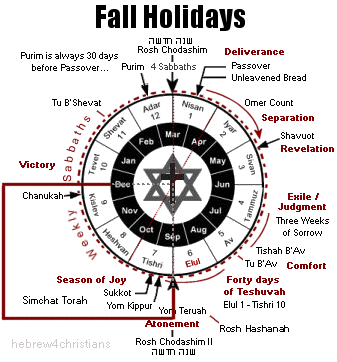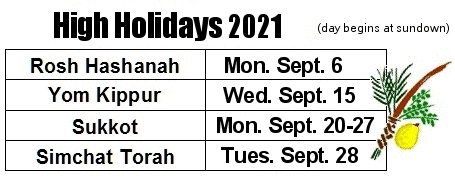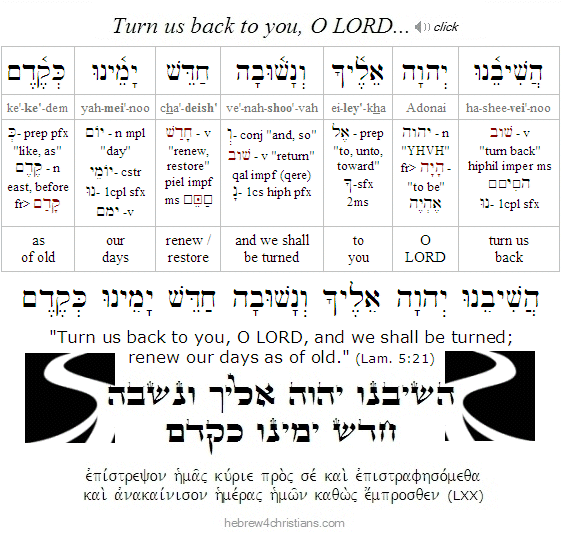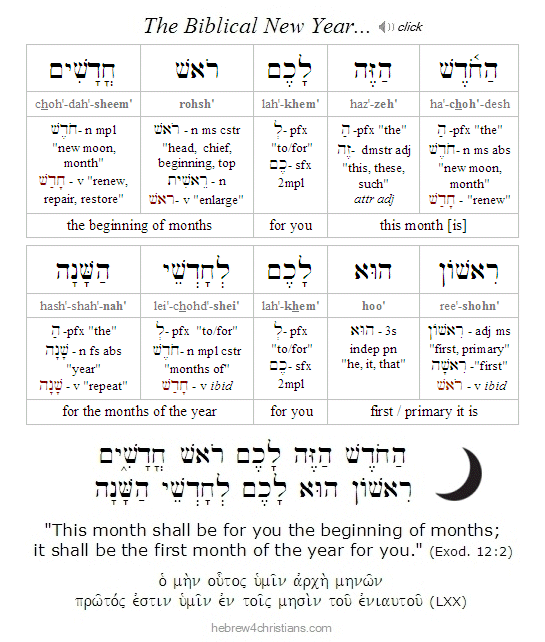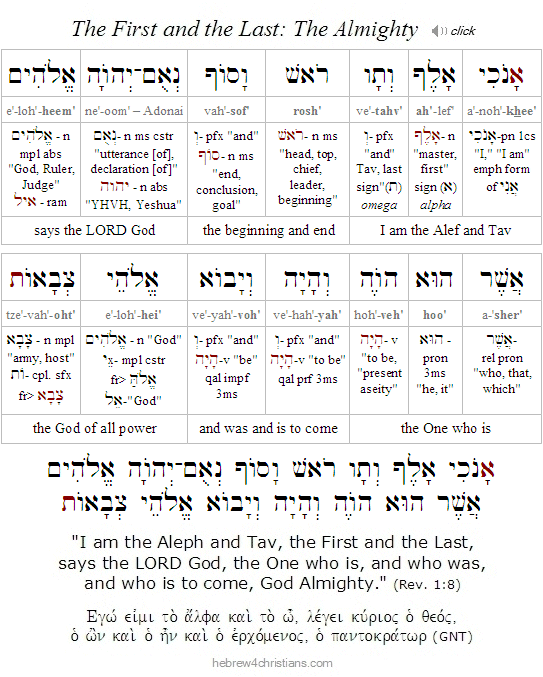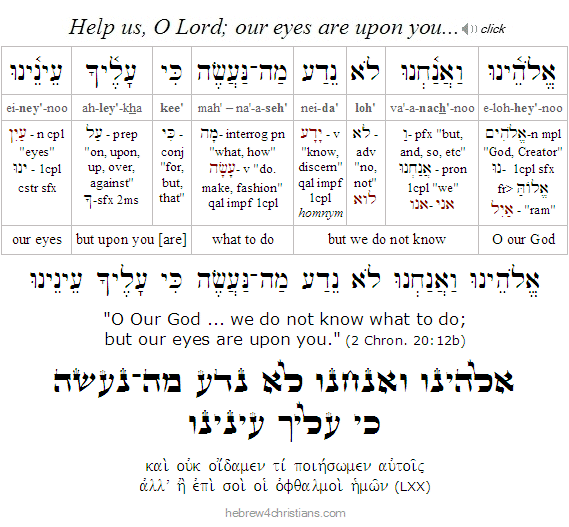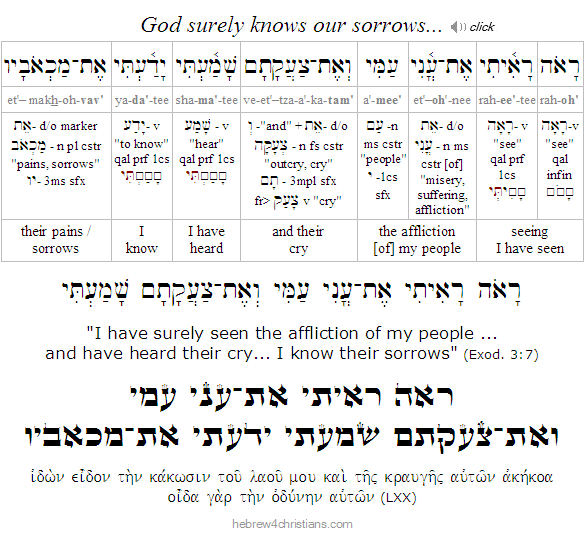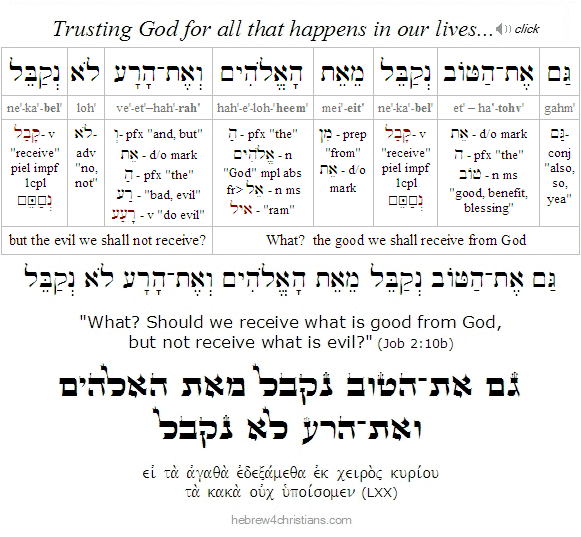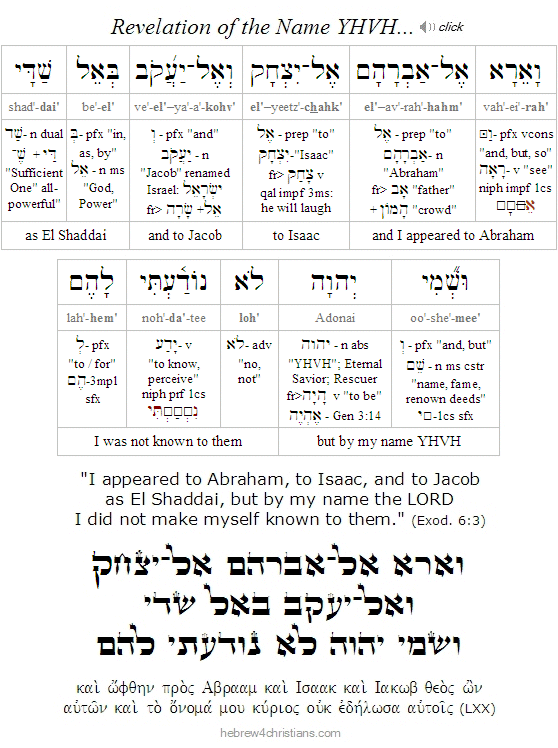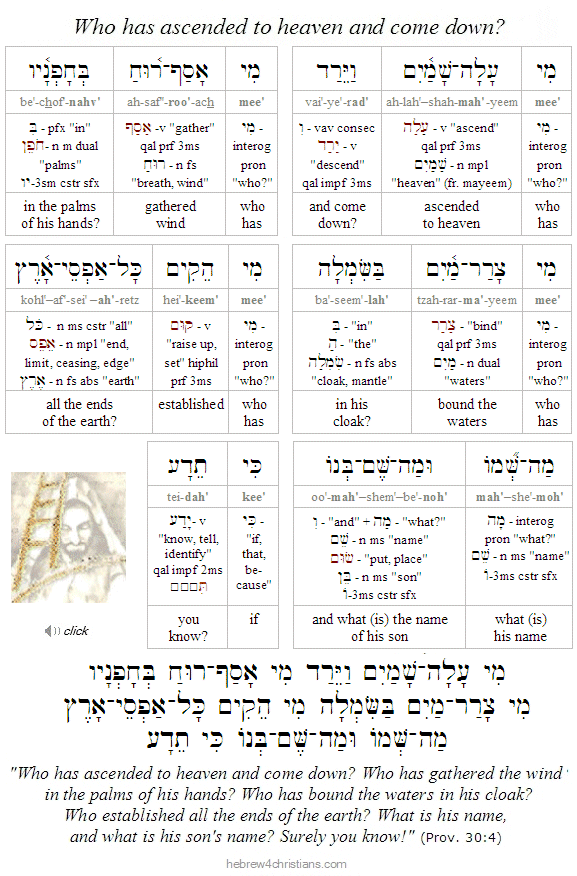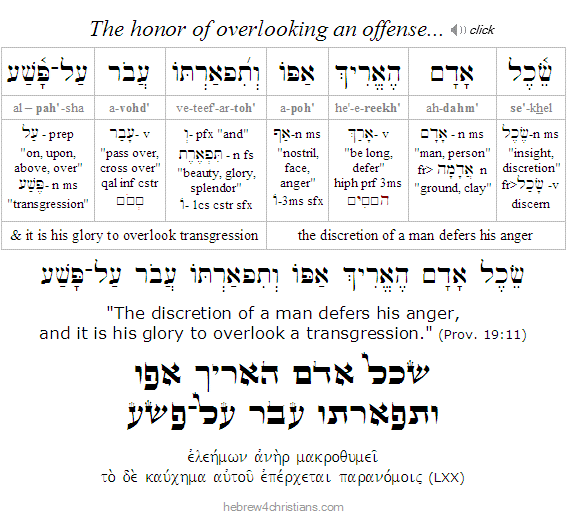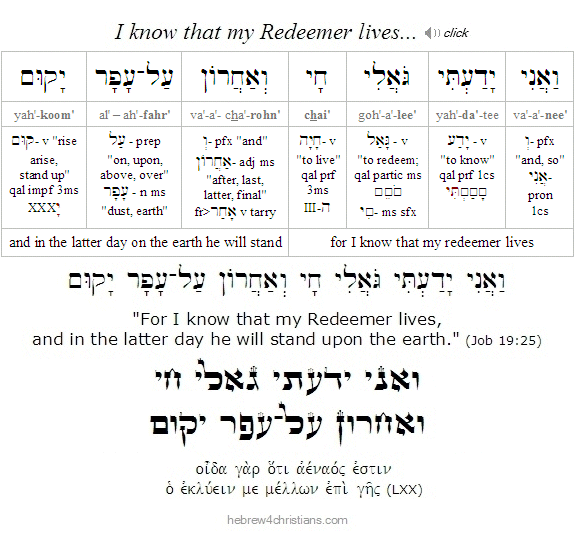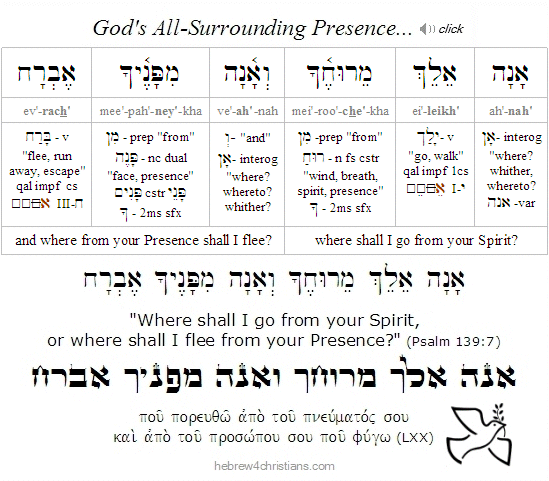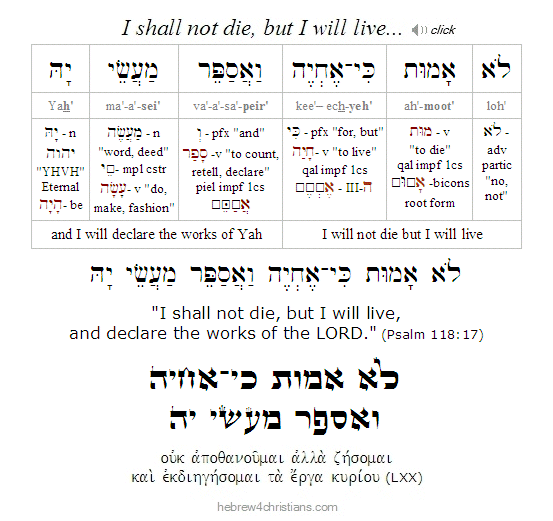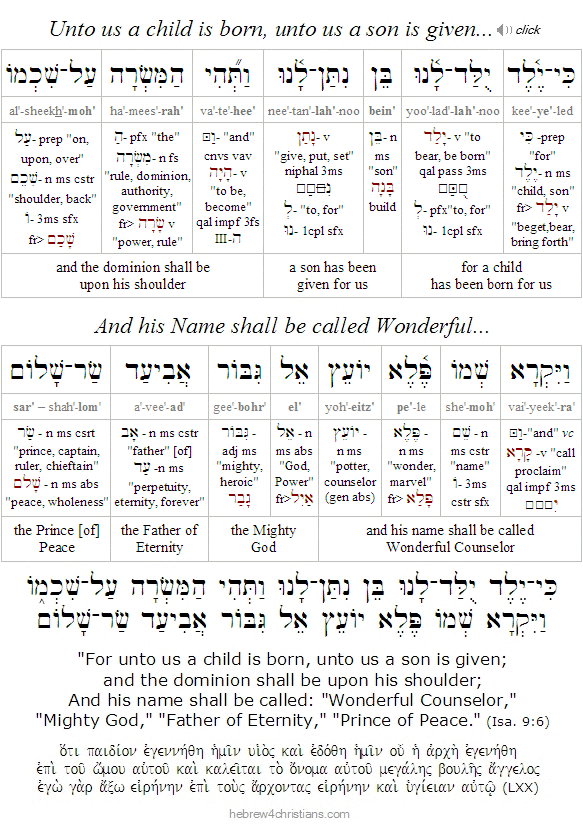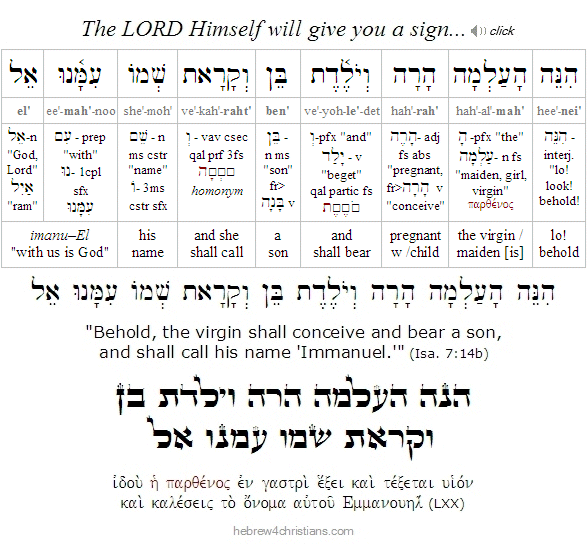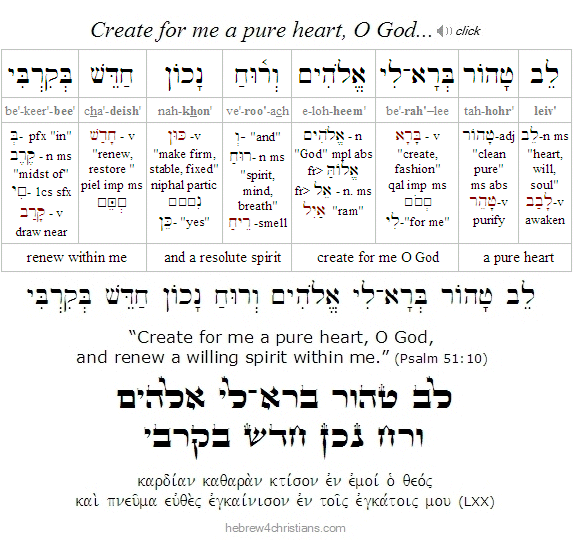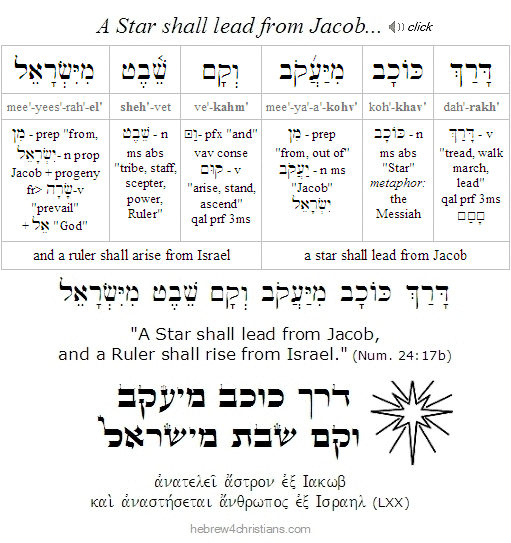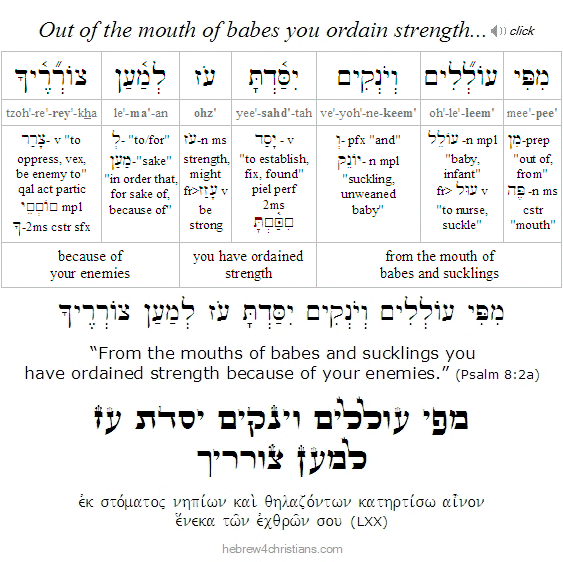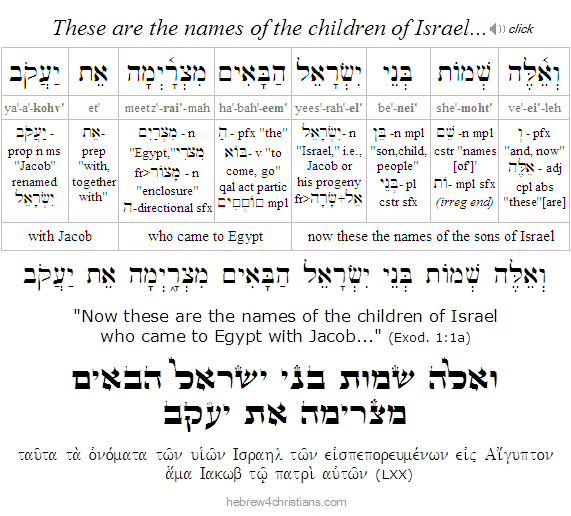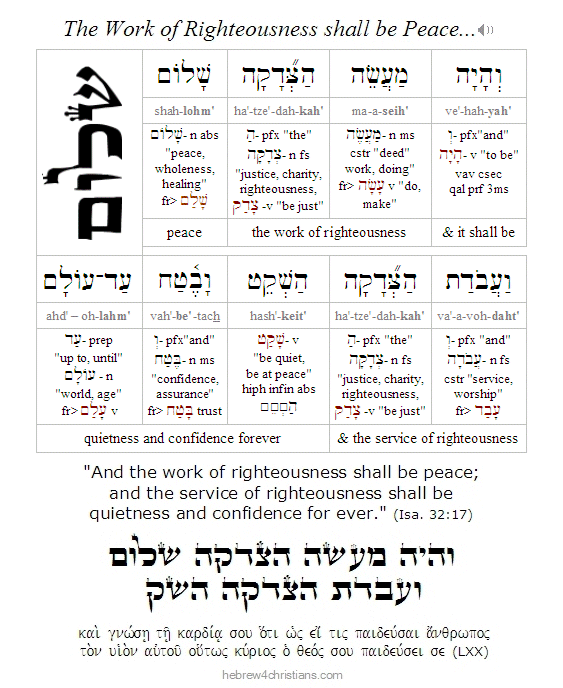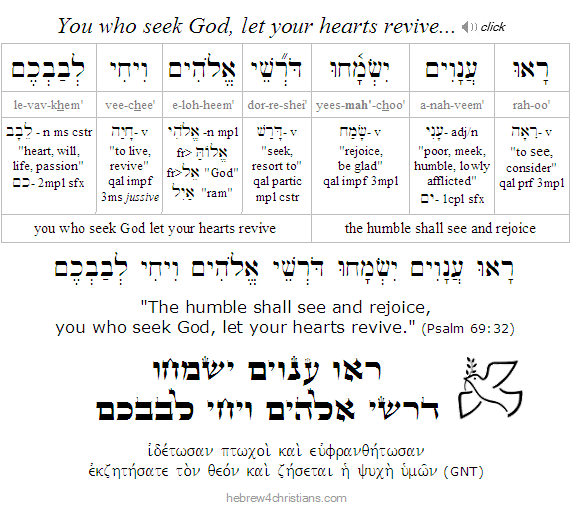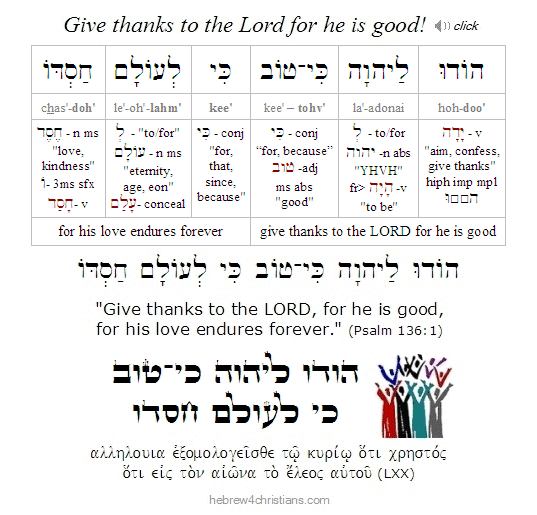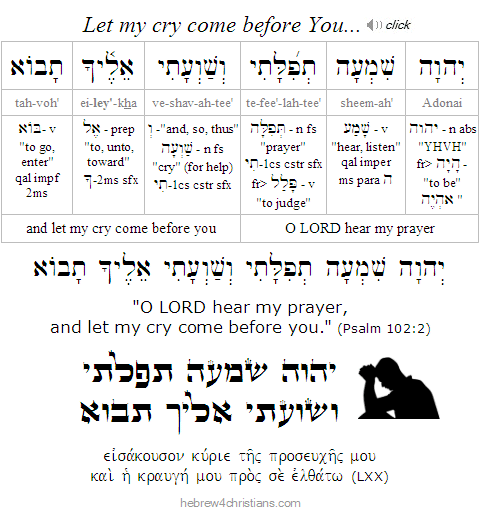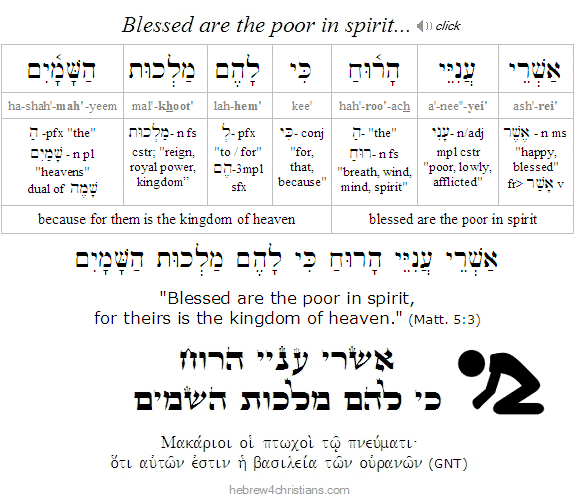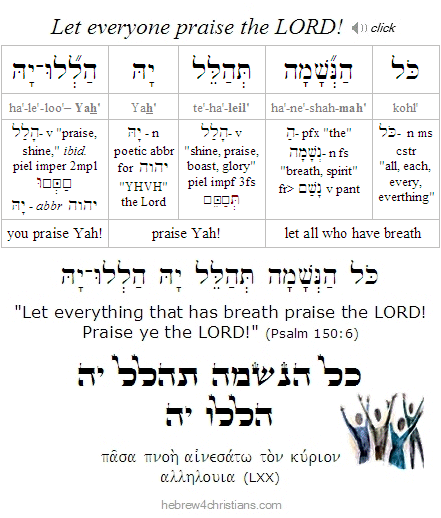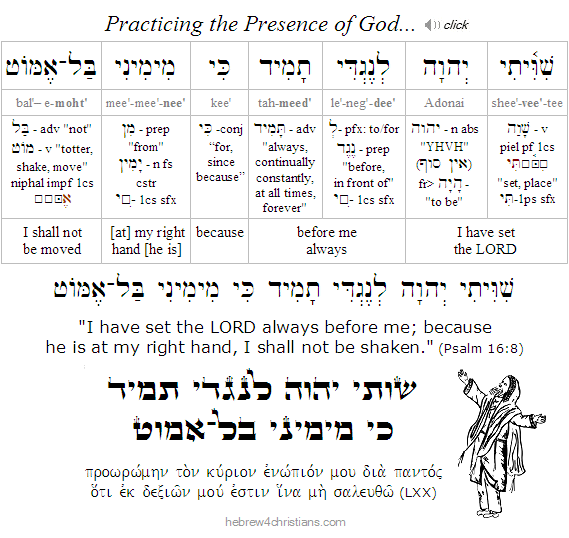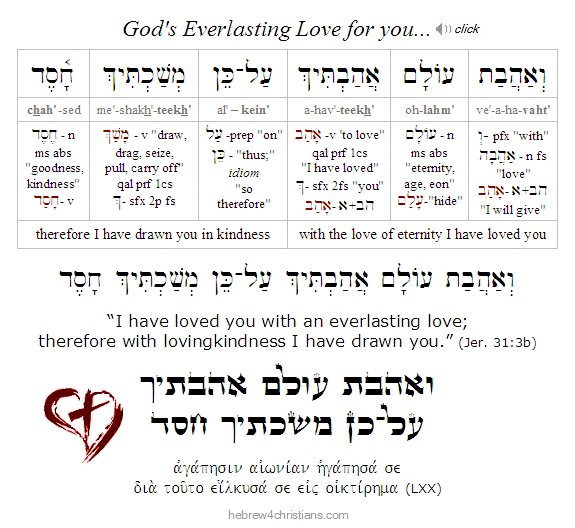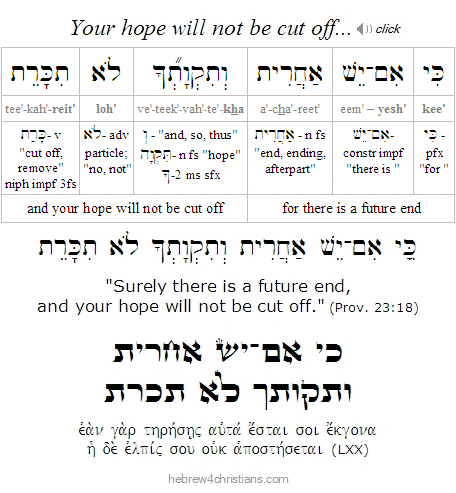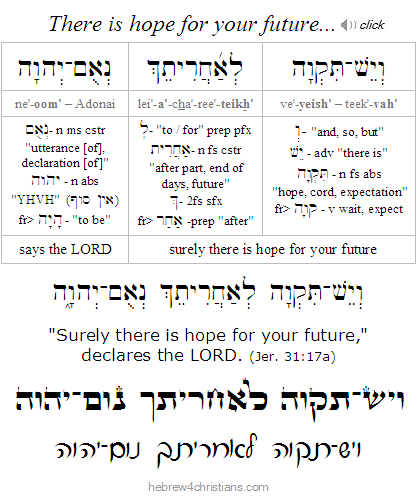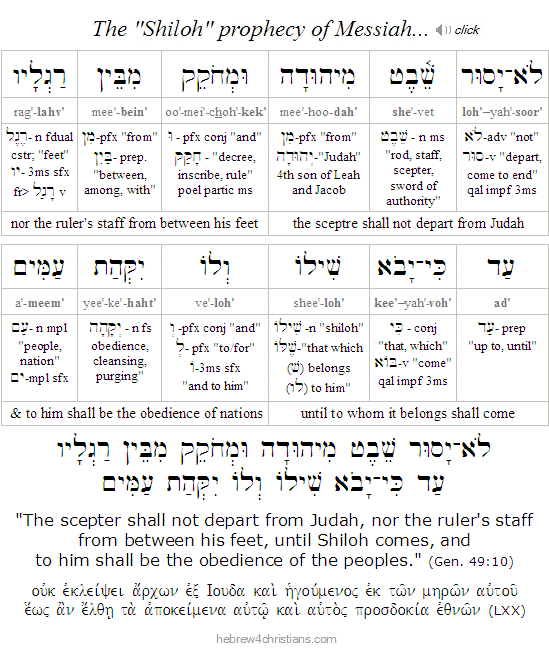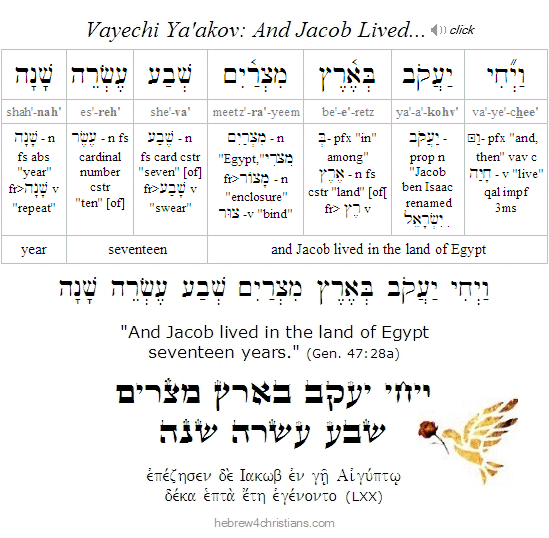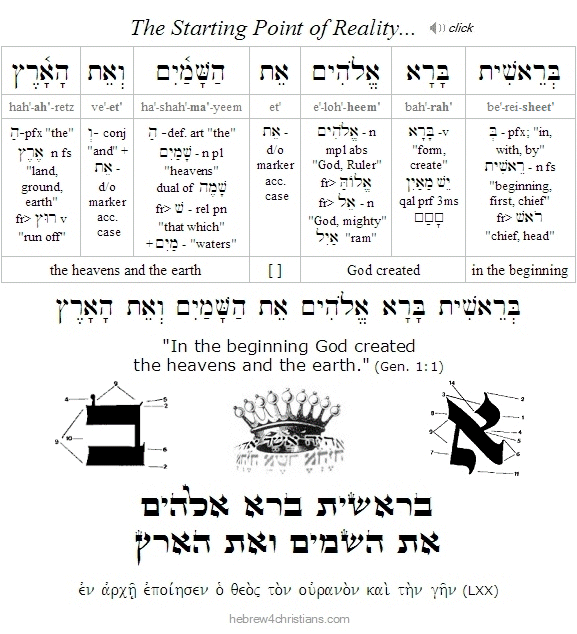|
Jewish Holiday Calendar
For December 2021 site updates, please scroll past this entry....
The Jewish civil year begins in the fall, though the Biblical year begins in spring (Exod. 12:2). Preparations for the fall holidays begin with a thirty day period of teshuvah (repentance) during the (late summer) month of Elul. The following ten days begin with the Feast of Trumpets (i.e., Rosh Hashanah, on Tishri 1) and end with the Day of Atonement (i.e., Yom Kippur, on Tishri 10). These first ten days of the new year are called the "Ten Days of Awe" (i.e., aseret ye'mei teshuvah: עֲשֶׁרֶת יְמֵי תְּשׁוּבָה), or simply the Jewish "High Holidays." Just five days after the solemn time of Yom Kippur begins the joyous week-long festival of Sukkot ("Tabernacles"), which is immediately followed by the celebration of Simchat Torah. The holiday of Chanukah occurs in late fall and carries over to the winter season:
The Fall Holidays:

The fall festivals prophetically indicate the Day of the LORD, the second coming of Yeshua, the great national turning of the Jewish people, and the establishment of the reign of the Messiah upon the earth during the Millennial Kingdom in the world to come.
Note that in accordance with tradition, holiday dates begin at sundown. Moreover, some holidays may be postponed one day if they happen to fall on the weekly Sabbath:
1. Month of Tishri (Mon. Sept. 6th [eve] - Tues. Oct. 5th [day]) - Fall holidays here!
2. Month of Cheshvan (Tues. Oct. 5th [eve] - Thurs. Nov. 4th [day])
- Four Sabbaths: Noach, Lekh-Lekha, Vayera, Chayei Sarah
- Yom Ha'Aliyah - Honoring Israel's immigrants (Wed. Oct. 13th; Cheshvan 7)
- Sigd - 50th day after Yom Kippur; Ethiopian Jewish holiday Wed. Nov. 4th)
3. Month of Kislev (Thurs. Nov. 4th [eve] - Fri. Dec. 3rd [day])
- Four Sabbaths: Toldot, Vayetzei, Vayishlach, Vayeshev
- Chanukah: Sun. Nov. 28th - Mon. Dec. 6th
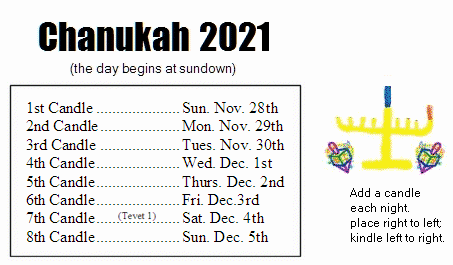
- Dates for Chanukah 2021 (5782):
- 1st Chanukah candle - Sun. Nov. 28th [i.e., Kislev 25]
- 2nd Chanukah candle - Mon. Nov. 29th [i.e., Kislev 26]
- 3rd Chanukah candle: Tues. Nov. 30th [i.e., Kislev 27]
- 4th Chanukah candle: Wed. Dec. 1st [i.e., Kislev 28]
- 5th Chanukah candle: Thurs. Dec. 2nd [i.e., Kislev 29]
- 6th Chanukah candle: Fri. Dec. 3rd [i.e., Kislev 30]
4. Month of Tevet (Fri., Dec. 3rd [eve] - Sun. Jan. 2nd [day])
- Four Sabbaths: Miketz, Vayigash, Vayechi, Shemot
- Dates for Chanukah (continued):
- 7th Chanukah candle: Sat. Dec. 4th [Tevet 1 - Chodesh Chanukah]
- 8th Chanukah candle: Sun. Dec. 5th [Tevet 2] Zot Chanukah
- Asarah B'Tevet - Tues. Dec. 14th (dawn), 2021; fast over the seige of Jerusalem
- Christmas - Sat. Dec. 25th (Tevet 21, 5782)
- Secular New Year: Sat. Jan. 1st, 2022 (Tevet 28, 5782)
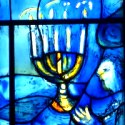 |
Note: For more about the dates of these holidays see the Calendar pages....
December 2021 Updates
Turning to a New Year...

12.31.21 (Tevet 27, 5782) The Book of Lamentations is an acrostic (i.e., alphabetical) poem that begins with the Hebrew letter Aleph (א) in the word "eichah" (אֵיכָה), which also marks the Hebrew name of the book. "How (eichah) lonely sits the city that once was full of people!" (Lam. 1:1). The sages note that this word "how" (i.e., eichah) could also be read as "where are you?" (i.e., ayeka: אַיֶּכָּה), God's first word spoken to Adam after he broke covenant in the Garden (Gen. 3:9).
Note that God's question is often our own: "Where are you? Where are you, God? Are you here, in the midst of this tedious moment? Do you know my loneliness, my ache for love? Do you understand the troubles of my heart?" And yet how many people have faith that God's call is one of comfort and restoration? God uses our loneliness ("how lonely...") to search our hearts, asking each of us, ayeka – "Where are you?" Return to Me. "Why have you turned away from me and chosen a state of exile?" Our haunting sense of God's absence impels us to seek for him... God awaits our only possible response, "Hashivenu!" -- an imperative (urgent appeal) for the grace to repent: "Turn us back to yourself, O LORD, so that we may return to you; renew our days as of old" (Lam. 5:21).
Hebrew Lesson:
Lamentations 5:21 Hebrew reading (click):
Our response to the questioning love of the LORD is called teshuvah ("turning [shuv] to God"). Teshuvah is an "answer" to a shelah, or a question. God's love for us is the question, and our teshuvah – our turning of the heart toward Him – is the answer. As Jeremiah confessed in the hour of great trouble: "I called upon thy name, O LORD, from the depths of the pit; Thou hast heard my voice: hide not thine ear at my breathing, at my cry. Thou drewest near in the day that I called upon thee: thou saidst, Fear not" (Lam. 3:55-57).
Mystery of God's Love...
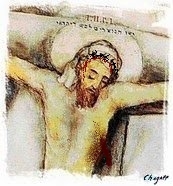
12.31.21 (Tevet 27, 5782) It may seem obvious if you stop and think about it, but all of the commandments of God given in the New Testament are spoken to the "new heart" that was miraculously imparted at regeneration, that is, to the heart upon which the truth of Torah is written "inwardly" (Ezek. 36:26; Jer. 31:33). The unregenerated soul, on the other hand, is unable to receive the deeper truth of salvation, since it always seeks a reason for being approved or accepted; it searches for justification of its life in its own terms, and therefore it lives in state of ongoing despair and secret dread... The message of the gospel, however, is that God saves the "poor in spirit" - the unworthy, the powerless, the lost. If we look for a reason why we are chosen by God, we are tempted to regard God's disposition toward us as conditional and uncertain. God's love is greater than reason, however, for the LORD loves his own simply because he loves them, and that's about all that can be said (Deut. 7:8-10).
Hebrew Lesson
Deut. 7:6b Hebrew reading (click):
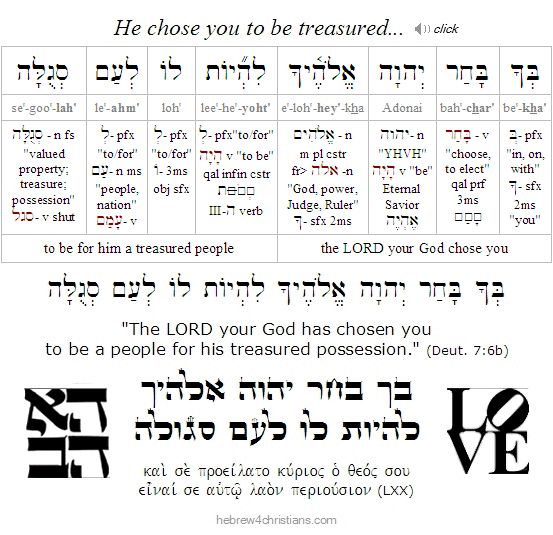 |
Teshuvah and Waste Places...

[ The following entry is related to this week's Torah reading (Parashat Shemot). Please read the Torah portion to "find your place" here. ]
12.31.21 (Tevet 27, 5782) Forty years before encountering the LORD in the burning bush, Moses was full of himself, a prince of Egypt "mighty in word and deed" who self-consciously regarded himself as Israel's deliverer (Acts 7:22-25). But Moses' "Egyptian-styled" ego led him to regard murder and human uprising as the means of deliverance, and consequently God sent him into exile to think things through... It was there, in the waste places of the desert, that God's education began - the school of brokenness, teshuvah, and heart-listening... Only after this did the LORD appear to him, calling out to the man who had lost all confidence in the flesh. Moses' humility mirrored the emptiness of the desert: "Who am I?" he protested, "I can't do this thing..." (Exod. 3:11). Exactly! Now he understood. Similarly, we must be careful not to regard ourselves as "strong," since the power of the flesh is useless for the purposes of heaven (Zech. 4:6). As it is written, "Thus says the LORD: 'Cursed is the man who trusts in man and makes flesh his strength, whose heart turns away from the LORD. He is like a shrub in the desert, and shall not see any good come. He shall dwell in the parched places of the desert, in an uninhabited salt land" (Jer. 17:5-6). It was only after Moses' question, "Who am I?" was answered by God's "I AM who I AM," that the "useless shrub" became aflame with God's power...
Moses' rod, which he had relied upon for years in the desert as a shepherd, was transformed to be used as an instrument of Divine Power (Exod. 4:1-5). God entrusts the rod of His authority only in the hands of a truly broken man.... Similarly, though Moses was described as a man "mighty in word and deed," these were attributes of the flesh unrefined by the Spirit of God. Therefore, after being humbled in the desert, Moses confessed that he was kevad peh - "heavy of mouth" and kevad lashon, "heavy of tongue," and unable to speak on behalf of the LORD. God then told him that He would "be with his mouth" to teach him what to say (Exod. 4:10-12). This likewise teaches that God entrusts the utterance of his word to the tongue of a genuinely broken man...
Mystery and God's Name...
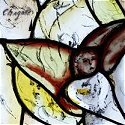
[ The following is related to our Torah for this week, Parashat Shemot... ]
12.31.21 (Tevet 27, 5782) When Moses asked why he was chosen to be God's emissary, the LORD did not explain His choice in natural terms; nor did not appeal to Moses' past experiences, his potential, his famly lineage, or even his great humility... Instead God simply said that whatever inadequacies Moses might have, being in relationship "with Him" was entirely sufficient: ki ehyeh imakh (כִּי־אֶהְיֶה עִמָּךְ): "for I will be with you" (Exod. 3:12). That is all that Moses would truly need...
When Moses then sought for some way to justify his role as a prophet sent from God, he sought to know God's secret "name" (see Exod. 3:13). God's response to the request was enigmatic: אֶהְיֶה אֲשֶׁר אֶהְיֶה - ehyeh asher ehyeh: "I will be what I will be" (or I am what I am), which may be understood as, "It doesn't matter what my Name is - I will be what I will be - all that matters is that I will be with you (ehyeh imakh) -- and that is enough! Indeed, God's name is nifla (נִפלָא) - "wonderful and incomprehensible" (Judges 13:18; Psalm 139:6), since the LORD is infinite and beyond comparison to finite things (Psalm 147:5). God is the great "I AM" that pervades all of Reality (אָנכִי), the glorious Eternal Personal Presence (i.e., hayah, hoveh, ve'yihyeh) whose power constantly sustains all things. Most of all, God is declared and expressed as our Savior, the One who reveals the face of God to us all (2 Cor. 4:6).
Hebrew Lesson
Exod. 3:14a Hebrew reading (click):
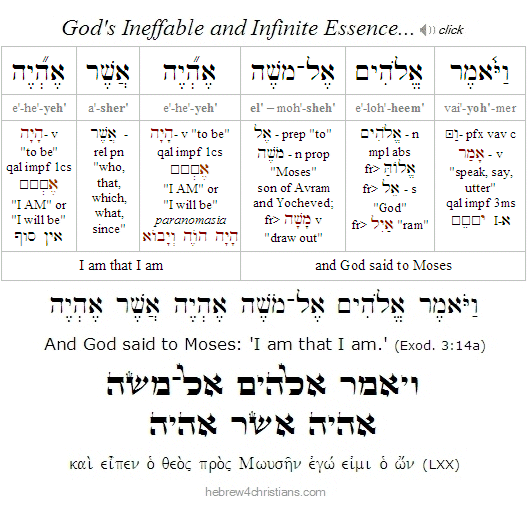 |
Regarding the question of whether we can fully apprehend the inner meaning of the Name of God, we read the following vision from the New Testament: "Then I saw heaven opened, and behold, a white horse! The one sitting on it is called 'Faithful and True' (נֶאֱמָן וְיָשָׁר), and in righteousness he judges and makes war. His eyes are like a flame of fire, and on his head are many diadems, and he has a Name written that no one knows but himself (שֵׁם כָּתוּב אֲשֶׁר לא־יָדַע אִישׁ כִּי אִם־הוּא לְבַדּוֹ). He is clothed in a robe dipped in blood, and the Name by which he is called is 'the Word of God' (דְּבַר הָאֱלהִים). And the armies of heaven, arrayed in fine linen, white and pure, were following him on white horses. From His mouth comes a sharp sword with which to strike down the nations, and He will rule them with a rod of iron. And He will tread the winepress of the fierce fury of the wrath of God, the Ruler over All, the LORD God Almighty (יְהוָה אֱלהֵי צְבָאוֹת). On his robe and on his thigh he has a Name written, the King of kings (מֶלֶךְ הַמְּלָכִים) and the Lord of lords (אֲדנֵי הָאֲדנִים). And with the breath of his lips He will slay the wicked" (Rev. 19:11-16).
Notice that in this passage the LORD both has a Name that no one knows but Himself and also that is He is called 'Faithful and True,' 'the Word of God,' and so on... In other words, within Himself God's Name is something that only He can truly understand, though we can know what He is called based on the revelation and analogical language of the Scriptures.
About the Secular New Year...

12.30.21 (Tevet 26, 5782) In most countries of the world, "New Year's Day" is usually celebrated as a "revelry" on January 1st, though this date comes from the arbitrary decree of the consuls of ancient (and pagan) Rome -- certainly not from anything taught in the Torah and the Hebrew Scriptures. Nevertheless, some Christian churches plan their own celebrations, offering a religious service to make resolutions and to offer up special prayers. (Because it falls eight days after December 25th, some Roman-influenced churches observe this date as the "Festival of Christ's Circumcision.") Many mainline churches plan "midnight" communion services so that the sacraments could be taken just before the start of the "new year." Now while all this might be encouraging and helpful on some level, it needs to be stressed that the civil New Year that the world celebrates is not a Biblical holiday at all, and in fact is contrary to the Biblical Calendar that was revealed in the Torah and Scriptures.
According to Torah there are two mirroring "New Years" observed during the year. The first occurs two weeks before Passover (Nisan 1) and the second occurs ten days before Yom Kippur (Tishri 1). The first is called Rosh Chodashim (see Exod. 12:2), which commemorates the month of the redemption of the Jewish people (i.e., the month Yeshua was sacrificed for our sins), whereas the second is called Yom Teru'ah that is associated with the "Feast of Ingathering" at the "end of the year" (Exod. 23:16, 34:22). Later Yom Terua'h became known as Rosh Hashanah ("the head of the year") which began a ten-day "trial" of humanity climaxing on the Day of Atonement (Yom Kippur).
The two "new years" of the Jewish calendar mirror each other and reveal the two advents of Messiah. For more information about the secular New Year and its relationship to the calendar of Torah, see the H4C article:
Hebrew Lesson:
Exodus 12:2 Hebrew reading lesson (click):
Slavery and Passivity...
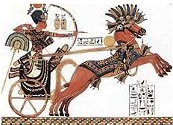
12.30.21 (Tevet 26, 5782) From our Torah portion this week (Va'era) we read, "I will bring you out from under the burdens of the Egyptians" (Exod. 6:6). The sages say the Hebrew word for "burdens" (סִבְלת) can also be read as passivity (סְבִילוּת): "I will deliver you from passivity toward your slavery...." So long as the people regarded their enslavement as tolerable, they could excuse it, rationalize it, and even defend it. Therefore God allowed tribulation to progressively increase so that the people would understand their need. Likewise we cannot even begin to understand our need for deliverance as long as we are comfortable, numb, and dead inside... The first step toward moral freedom, then, is to be set free from our denial, to wake up, to resist evil, and to find faith that God desires something better for our lives. Passively accepting the values of this evil world means succumbing to its false claims to authority. As Bonhoeffer solemnly reminds us: 'Silence in the face of evil is itself evil: God will not hold us guiltless. Not to speak is to speak. Not to act is to act.'
"What constitutes the bulwark of our own liberty and independence? It is not our frowning battlements, our bristling sea coasts, the guns of our war steamers, or the strength of our gallant and disciplined army. These are not our reliance against tyranny in our fair land. All of them may be turned against our liberties, without making us stronger or weaker for the struggle. Our reliance is in the love of liberty which God has planted within us. Our defense is in the preservation of the spirit which prizes liberty as the heritage of all men, in all lands, everywhere. Destroy this spirit, and you have planted the seeds of despotism at your own doors. Familiarize yourselves with the chains of bondage, and you prepare your own limbs to wear them. Accustomed to trample on the rights of those around you, you have lost the genius of your own independence, and become the fit subjects of the first cunning tyrant who rises." - Abraham Lincoln (Speech at Edwardsville, 1858)
Hebrew Lesson
Psalm 118:5 Hebrew reading (click):
Self-Destruction and Pride..
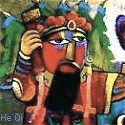
12.30.21 (Tevet 26, 5782) The tragic story of Pharaoh reminds us how pride can blind the heart. As Abraham Heschel said, "In a controversy, the instant we feel anger, we have already ceased striving for truth and have begun striving for ourselves." The truth needs no defense. If we find ourselves getting defensive or hostile, we need to take a step back and ask ourselves what we really believe... If we seek to use truth as a weapon, or as a means to rationalize our self-will, then we are not "in the truth," even if our facts in the matter may be correct. We must be careful not to find ourselves using the truth for our own agenda. Yeshua's words haunt the heart: "Without me you can do nothing" (John 15:5).
Kierkegaard notes: "The proud person always wants to do the right thing, the great thing. But because he wants to do it in his own strength, he is fighting not with man, but with God." Indeed, how many people seek visions, dreams, and private prophecies while they forsake the Spirit as it broods over the hearts of those around him or her? How many seek to "know God" as a matter of the pride of heart?
Hebrew Lesson
Proverbs 16:18 Hebrew reading (click):
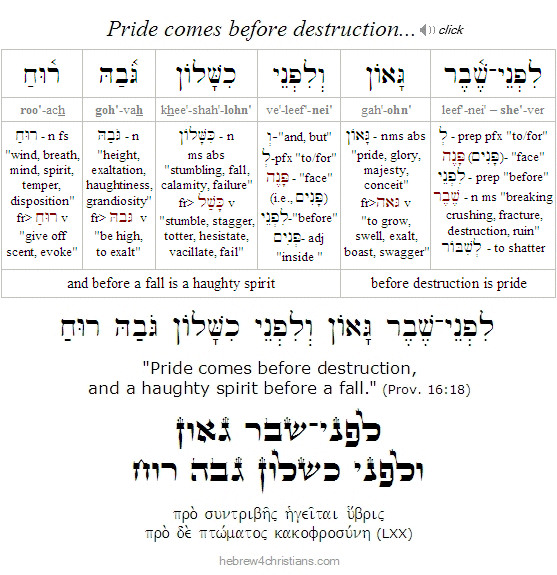 |
The Koretzer Rebbe was asked for instruction how to avoid sin. He replied, "Were you able to avoid offences, I fear you would fall into a still greater sin - that of pride" (Hasidic). The antidote to pride is the "fall of the soul," that is, those besetting sins and painful failures that (hopefully) bring us back to reality - namely, to the place of brokenness and our need for divine intervention... When we get "sick of our sickness" we enter into holy despair, and then the cry of the heart for lasting deliverance can be truly offered.
Truth and Moral Reality...
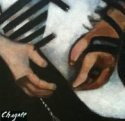
12.30.21 (Tevet 26, 5782) Those who think they are not bound by the laws of morality are enslaved to their lower nature, since the lower nature follows and justifies the appeals of natural impulse and instinct without reflection. Yet denying moral reality is as dangerous as defying the law of gravity, and ultimately is futile. Moral skepticism and relativism are ultimately "unlivewithable," since they deny the most basic experiences of the heart (Rom. 1:19). Moral truth, on the other hand, is plainly apprehended by all who heed the voice of conscience and who esteem what really matters in life - meaning, truth, love, justice, beauty, and so on. Ethical reality is not discovered in a science lab but rather in the reverence of the human heart. In fact, science itself is impossible apart from values and assumptions that regard the knowledge of empirical reality as better than living in a state of ignorance.
Moral truth finds its source and authority in the LORD who fashioned human beings in His image and likeness. We cannot deny moral reality without desecrating ourselves. The Torah teaches that the universe itself was not caused but created, and therefore creativity, value, beauty, freedom, and personhood are at its essence. We are not victims of an impersonal machine, nor is the universe a closed-system of cause and effect that somehow operates apart from the immanent Presence of God. Whether people want to accept it or not, they are bound to live in light of moral reality, and they deny it to their own peril.
Hebrew Lesson
Psalm 19:2 Hebrew reading (click):
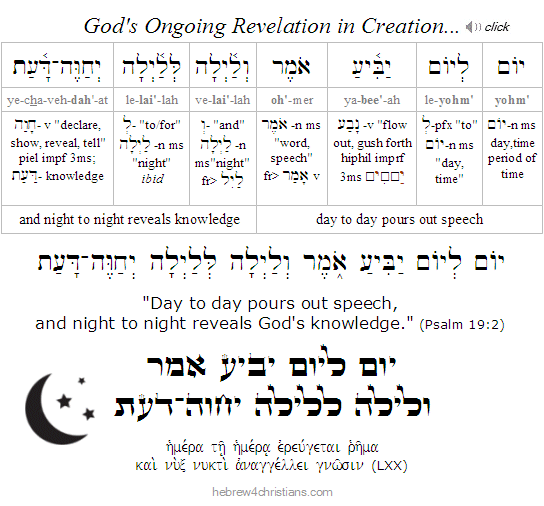 |
Providential Impediments...
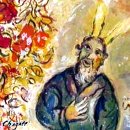
[ The following is related to our Torah reading for this week, Parashat Va'era... ]
12.30.21 (Tevet 26, 5782) The midrash says Moses had a speech impediment and that is why he described himself as "heavy of mouth and of tongue" (כְּבַד־פֶּה וּכְבַד לָשׁוֹן), unfit to speak on behalf of God (Exod. 4:10). God reassured him, however, by reminding him that his limitation was by divine providence: "Who has made man's mouth? Who makes him mute, or deaf, or seeing, or blind? Is it not I, the LORD? Now therefore go, and I will be with your mouth and teach you what you shall speak" (Exod. 4:11-12). The sages comment that God did not cure Moses of his stuttering because He wanted the Israelites to know Moses as his chosen messenger. When he spoke in the Name of the LORD, the stuttering disappeared and Moses spoke with fluent ease. This was to teach the people not to trust in human oratory or wisdom, but rather in the power of God (see 1 Cor. 2:1-5). Just as the Apostle Paul, the "Moses of the New Covenant" (i.e., the teacher of the meaning of the new covenant as Moses was the teacher of the Sinai covenant) was given a "thorn in the flesh" (σκόλοψ τῇ σαρκί) to keep him humbly relying upon God for his sufficiency to serve (2 Cor. 12:7-10), so Moses was rendered entirely dependent upon the LORD to speak as his mediator.
And He said to me, dai lekha chasdi (דַּי לך חַסְדִּי): "My grace is sufficient for you, for My power is made perfect in weakness." I will boast all the more gladly of my weaknesses, so that the power of Messiah (גְּבוּרַת הַמָּשִׁיחַ) may rest on me" (2 Cor. 12:9). Amen, and may our heart respond: ken chasdekha dai li (כֵּן חַסְדךָ דַּי לִי): "yea, your grace is sufficient for me."
Hebrew Lesson
Isaiah 40:29 Hebrew reading (click):
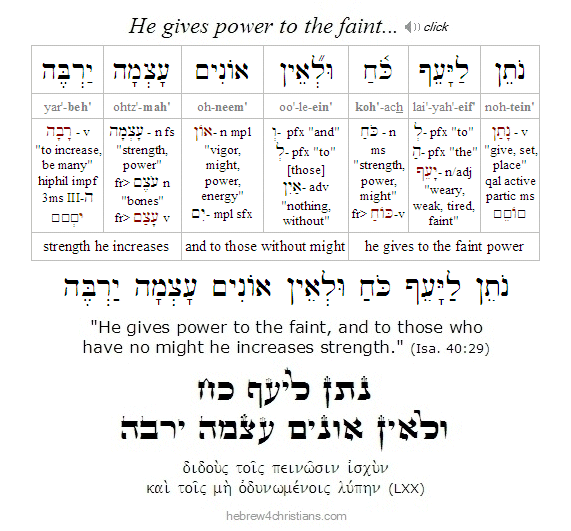 |
Note: Midrashim (מדרשים) are imaginative stories and commentaries that the Jewish people have shared about Torah for thousands of years... There are various collections of midrashim available, such as Artscroll's Tzenah Urenah, among others.
Surrendering to God's Care...

12.29.21 (Tevet 25, 5782) "Dear God, grant me the serenity to accept what I cannot change - including the insanity of this world, the corruption of godless politicians, the prevalence of sickness and death, the welfare of my family and friends, and so on. O precious Lord, grant me the faith I need to know your sovereign care, and to firmly believe that "all is well and all manner of thing shall be well." Amen.
So much of what happens in this world humbles us and reminds us of our powerlessness and frailty... Getting sick, for example, is a humbling venture, a "kenosis" of sorts -- wherein our flesh, which dies hard, and our inherent pride that vainly seeks to control outcomes, is emptied from us and we are rendered helpless. It is then that God's promise to be our strength in our weakness can be heard, though receiving that is a transaction of the heart that has its good days of faith and bad days of lament and questioning...
I refuse to be anxious over matters that lay completely outside of my control, such as whether some virus (man-made or otherwise) may sicken or even kill me. As a believer in the LORD, I understand that my life is not my own, and I willingly surrender it to His good will and care. I will die exactly when God says I will die, and not a moment sooner or later. "For whether we live, we live unto the Lord; and whether we die, we die unto the Lord: whether we live therefore, or die, we are the Lord's" (Rom. 14:8). Amen.
Hebrew Lesson
Psalm 23:4a Hebrew reading (click):
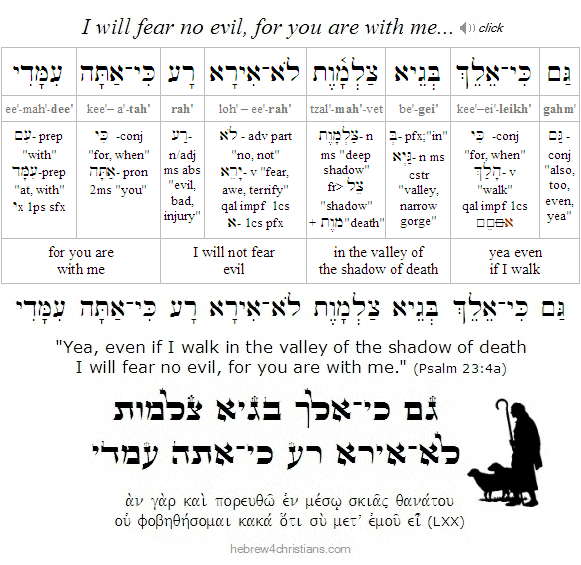 |
Source of our Breath...

[ The following is related to our Torah reading for this week, Parashat Va'era... ]
12.29.21 (Tevet 25, 5782) Though the meaning of God's Name (YHVH) was initially revealed to Moses as simply eheyeh (אֶהְיֶה), "I AM," or "I WILL BE" (Exod. 3:14), it is wonderful to realize that His Name was also revealed as eheyeh imakh (אהְיֶה עִמָּךְ), "I WILL BE WITH YOU" (Josh. 1:5,9; Isa. 41:10,13; John 10:28; Matt. 28:20, etc.). Just as the LORD is called Elohei ha-ruchot lekhol basar (אֱלהֵי הָרוּחת לְכָל־בָּשָׂר), "the God of the breath of all flesh" (Num. 16:22), so He is the Source of your breath, the One who exhales to you nishmat chayim (נִשְׁמַת חַיִּים), the "breath of life" that enables you to live (Job 12:10). Indeed the sacred Name YHVH (יהוה) first appears in the Torah in regarding imparting the breath of life to Adam (Gen. 2:7). Note further that each of the letters of the Name YHVH represent vowel sounds (i.e., breath), suggesting again that God's Spirit is as close as your very next breath. Like the wind that cannot be seen, so is the spirit the essential part of your identity. Yeshua breathed on his followers and said, "Receive the Holy Spirit" (John 20:22).
Note: It is a distraction to get anxious or even curious about how to pronounce God's name YHVH (יהוה). After all, that name is an abstract play on the Hebrew verb hayah ("to be") indicating that God is the Source and Ground of any and all existence whatsoever. The name of the LORD is therefore a name of power and sovereignty over all of creation. The most intimate name for God, however, is the one revealed from heaven for our salvation, namely "Yeshua" (ישׁוע), since His the "name above all names." He is our Abba and Healer. For a bit more on this topic see the article, "Using the Name in Vain."
Hebrew Lesson
Job 12:10 Hebrew reading (click):
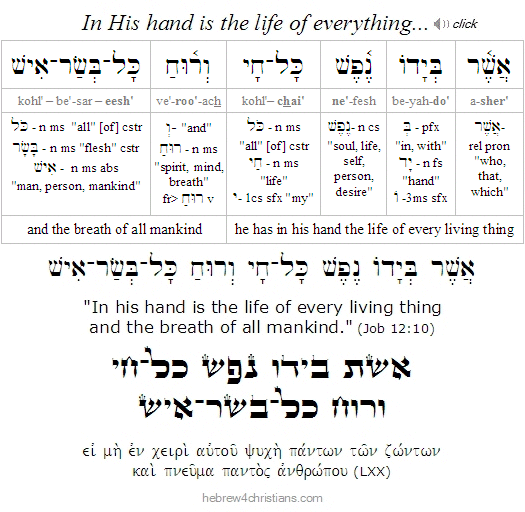 |
Suffering from a Hard Heart...
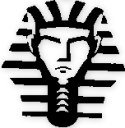
[ The following is related to our Torah reading for this week, Parashat Va'era... ]
12.29.21 (Tevet 25, 5782) The Scriptures define a heart that is insensitive, indifferent, unfeeling, and callous toward the needs of others as "hard" or "difficult" (קָשֶׁה). Often such hardness comes as a result of living in a fallen world. Many wounded people live with "scar tissue" that surrounds their heart, making them feel numb and unwilling to open up and trust others. Their affections have become disordered and their ego rationalizes blaming others or seeking various forms of entitlement. "Turning off your heart" can mean suppressing any positive regard for others (empathy) while nurturing anger and self-righteousness, or it may mean withdrawing from others as a lifeless shell (both approaches vainly attempt to defend the heart from hurt). Although Yeshua always showed great compassion, especially to the wounded and broken in spirit (Isa. 42:3), He regularly condemned the "hardness of heart" ("sclero-cardia," σκληροκαρδία) of those who opposed his message of healing and love.
A hard heart (לֵב קָשֶׁה) is closed off and impermeable to love from others, and especially from God. It is a "difficult" (קָשֶׁה) heart, inflexible and even cruel. Scripture uses various images to picture this condition, including a "heart of stone" (Ezek. 36:26, Zech. 7:12), an "uncircumcised heart" (Jer. 9:26), a "stiff neck" (Deut. 31:27), and so on. Stubbornness is really a form of idolatry, an exaltation of self-will that refuses to surrender to God. If you are wounded and afraid to open your heart in trust to others, ask God for healing...
God wants us to have "soft" hearts that are malleable and subject to His touch and influence. Consider the Biblical analogy of a potter who works with clay (Isa. 64:8, Jer. 18:6). Hard clay is brittle and hard to work with, though soft clay can be molded and adapted for a variety of uses. Applied to our heart attitudes, soft clay represents being open and moveable, whereas hard clay represents being inflexible, intolerant, and so on. A "hard hearted" person is closed-minded, assured of his own righteousness, and unwilling to admit the possibility of being wrong. He is really a "fragile" soul who is often hidebound by traditions, unwilling to be corrected, and usually so driven by fear and suspicion that he is unable to look at other possibilities. When we find ourselves becoming rigid, inflexible, and intolerant, we may be demonstrating hardness of heart.
Hardness of heart is something all of us deal with, even those who trust in Yeshua. After all, New Covenant believers are commanded to "put off the old self with its practices" (Col. 3:9) and are urged not to harden their hearts (μὴ σκληρύνητε τὰς καρδίας) through unbelief (Heb. 3:8,15, 4:7). The flesh dies hard, however, and "putting off" the old self requires divine intervention; however, if we cry out to the LORD for deliverance (especially from ourselves) He has promised to hear us (Rom. 10:13, Joel 2:32). The awareness that we are hardhearted and self-deceived can lead to a (blessed) sense of brokenness and despair -- i.e., to the realization that own self-sufficiency is futile and ultimately self-destructive. Turning to the LORD in despair of ourselves is a mark of humility. When we are emptied of ourselves, we are delivered from pride and self-deception and thereby enabled to truly ask for God's help... This is a miracle, since all of us have "a little Pharaoh inside," clamoring ti be the center of our universe and refusing to submit to the Presence of the LORD...
May God's blessing keep our hearts soft and open toward others... May the LORD give us a new heart, and put a new spirit within us. May He remove the heart of stone (לֵב הָאֶבֶן) from us and give us a heart of flesh (לֵב בָּשָׂר). May we be lev echad - "one heart" - with one another and with the Father (Ezek. 11:19). May we be so sensitized to the Presence of God that we detect the slightest touch from His hand upon us. Amen.
Hebrew Lesson
Ezekiel 36:26 Hebrew reading (click):
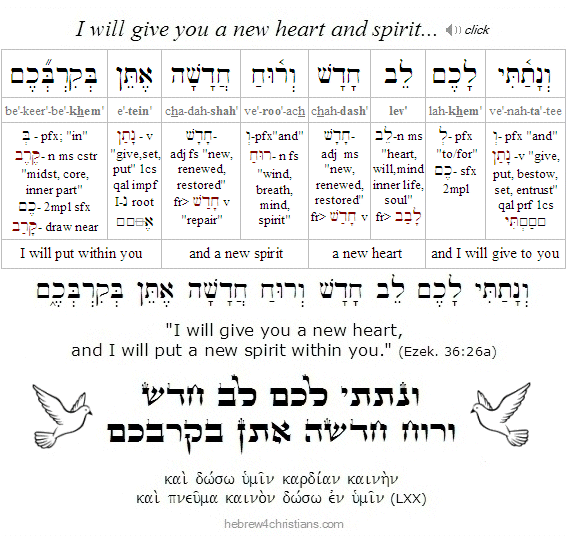 |
Taking the Name in Vain...

12.28.21 (Tevet 24, 5782) The Third Commandment states: lo tisa et shem Adonai Elohekha lashav, "You shall not lift up (lit. "carry") the Name of the LORD your God in vain" (Exod. 20:7). Note that the Hebrew word lashav (לַשָּׁוְא), usually translated "in vain" in English, means in an empty or thoughtless manner (the LXX translates it as ἐπὶ ματαίῳ, "worthlessly" or "thoughtlessly"), though the word might also be rendered as "for show," that is, insincerely or for sake of others. Obviously "lifting up the Name" of God 'lashav' includes invoking the Divine Presence in profane and vulgar ways, but it also includes "lip-service" expressions of faith, mechanical confessions, heartless acts of service, and so on. "Lifting up the Name" should never be used as a "weapon" against others, nor should it ever be used to justify or practice violence. You cannot "call upon God's Name" in the truth without first exercising genuine reverence by recognizing the sacredness of life, the value of other people, and the LORD's all-consuming glory, love, and power...
Hebrew Lesson
Exodus 20:7a Hebrew reading (click):
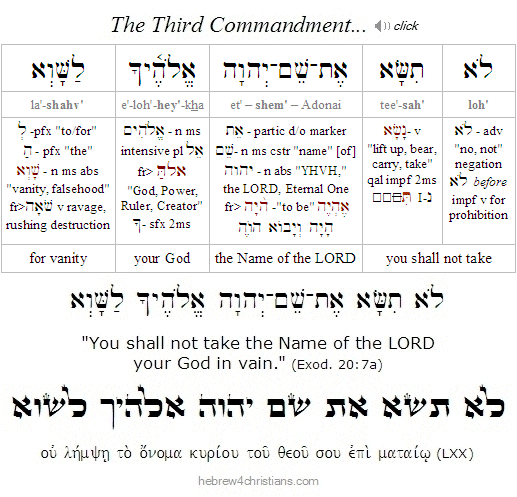 |
Reverencing the Name of the LORD means being in a personal, vital, and all-important relationship with the truth. The Holy Spirit is called the Spirit of Truth (רוּחַ הָאֱמֶת). This means understanding God's character as "merciful and gracious, slow to anger, and abounding in steadfast love and faithfulness, extending kindness to the thousandth generation, forgiving iniquity, transgression, and sin" (Exod. 34:6-7). Since the Hebrew idea of word (דָּבָר) is coextensive with truth (i.e., "thing"), Yeshua is called the Word of God (דְּבַר אֱלהִים) who represents the Name of God to all who trust in Him (John 17:26, Heb. 1:3). Indeed Yeshua is the true Name of God, the "substance" (being) of God, the "exact imprint and representation of His nature," and so on. "His eyes are like a flame of fire, and on his head are many diadems, and he has a name written that no one knows but himself. He is clothed in a robe dipped in blood, and the name by which he is called is 'The Word of God" (Rev. 19:12-13). The New Testament describes Yeshua as the "Aleph and the Tav, the one who is and who was and who is to come, God Almighty" (Rev. 1:8).
Hebrew Lesson
Revelation 1:8 Hebrew reading (click):
Knowing God's Name...

12.28.21 (Tevet 24, 5782) You may feel anxious about knowing God, about how to relate to him or how to understand or interpret the Scriptures, though the heart can only know the essential meaning of God in the state of its need, as its ultimate concern, and therefore unless you cry out "from the depths" of your being, you are merely intellectualizing or playing games... After all, the inner heart asks "How can I find God?" "How can I relate to God?" "How can I find hope and life?" but the answers to such questions are found by personal encounter with the reality of the Spirit of God, not by theological rationalizations.
It is one thing to say "Lord" or "Master" but quite another to say "my Lord," or "my Master..." The Torah teaches that name of God refers to that which God alone is, namely, the "I am that I am"(אהְיֶה אֲשֶׁר אֶהְיֶה) which is unknowable apart from the miracle of further disclosure within the heart. That is why we find so many different names and titles for God in Scripture, for these are additional disclosures to the heart in a time of its need. For instance, to know God's name as "Savior" (מוֹשִׁיעַ) means experiencing deliverance from your struggles, pains, and fears by the agency of God's victory, comfort, and consolation as given in Yeshua. However, unlike the experience of worldly education that might enable you accomplish certain tasks, spiritual education leads to a "dark clouds of unknowing" where you must regularly confess your weakness and your need for divine connection. God's name is therefore bound up with the basic quest within the heart for meaning, healing, and the desire of unconditional love. Knowing the name of God is an ongoing process as you struggle to accept and trust your life to be a blessing, and as you are enabled by the Holy Spirit to say "yes" and "amen" to life despite your failures, pains, fears, sorrows, and even your unanswered questions... It means opening your heart to life and believing that you are loved, that you are accepted, that you will be okay, and that God is holding you in his everlasting arms. Amen.
Hebrew Lesson
Psalm 63:3 Hebrew reading (click):
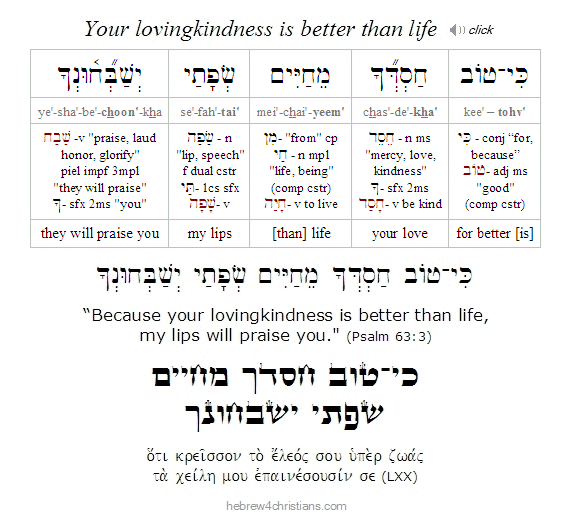 |
Thomas Aquinas' most significant work was his Summa theologiae or 'Summary of Theology,' a massive book that attempted to "systematize" all of Christian theology. He worked on it for many years, but when he was nearly finished he underwent a spiritual experience that, as he himself explained, made everything he had written "seem like straw." He thereafter gave up writing about "theology" after he encountered the Reality itself. Aquinas apparently moved from the realm of theoretical emunah (i.e., cognitive faith) to the realm of heartfelt bittachon (i.e., existential trust). Similarly, toward the end of his life and career someone asked the prolific theologian Karl Barth if he could sum up all that he had learned and written. Barth thought a bit and then replied, "Jesus loves me, this I know, for the Bible tells me so."
Lessons from Pharaoh...

[ The following entry is related to this week's Torah reading (Parashat Va'era) and the theme of freedom. Please read the Torah portion to "find your place" here. ]
12.28.21 (Tevet 24, 5782) Though he sometimes appeared to change his mind in light of the intervention of God, Pharaoh nevertheless reverted to his older thinking after the danger seemed to pass. Therefore the Torah states that after each of the first five plagues, Pharaoh hardened (lit., "strengthened") his heart. It was only after five successive opportunities to face reality, to give up his claim to be god, to turn to the LORD in humility, however, that God ratified Pharaoh's will by "helping him" become the person he decided to be. Therefore after the sixth plague we read, וַיְחַזֵּק יְהוָה אֶת־לֵב פַּרְעֹה - "And the LORD "hardened" Pharaoh's heart" (Exod. 9:12).
The sobering "Torah of Pharaoh" teaches us that God will never force a sinner to turn away from their sin, but if they willfully continue to sin, they may become unable to turn, trapped in a very difficult place.... The Shemot Rabbah states: "The Holy One, blessed be He, gives someone a chance to repent, and not only one opportunity but several chances: once, twice, three times. But then, if the person still has not repented, God locks the person's heart altogether, cutting off the possibility of repentance in the future." There is a very real risk that those who choose to be at war with God, who flatly refuse repeated appeals to turn to the LORD, will become progressively "strengthened" in their resolution to defy reality...
Hebrew Lesson
Psalm 95:8 Hebrew reading (click):
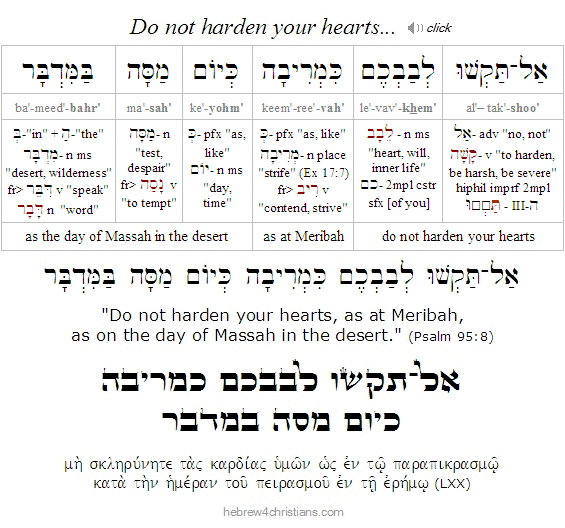 |
Note: Midrash says that the Pharaoh finally repented after he witnessed the splitting of the sea and the destruction of his cavalry...
Strength of Gentleness...
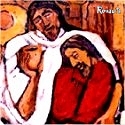
12.27.21 (Tevet 23, 5782) It is written in our Scriptures: "A gentle reply will turn away wrath, but a harsh word will arouse anger" (Prov. 15:1). The sages connect this mashal (proverb) with intercession regarding our sins. If we acknowledge our sins by appealing to God's favor and love, using gentle words, expressing remorse (i.e., devar etzev: דְּבַר־עֶצֶב, "a word of grief"), his compassion is evoked, but if we speak harshly - perhaps blaming others for our troubles or indulging in outrage, God's judgment is evoked. In the former case we appeal to God as YHVH (יהוה), the compassionate Savior; in the latter case we appeal to God as Elohim (אלהים), the Righteous Judge; however, in either case our heart attitude is reflected back to us (see Matt. 6:14-15; Psalm 18:25-26).
Regarding our interactions with others our tradition teaches that we should pursue peace (i.e., redifat shalom: רְדִיפַת שָׁלוֹם) and (if possible) quell hostile feelings when they arise (Heb. 12:14). If another person is angry about something we did, we should be quick to take responsibility and calm the other by reassuring him or her that we meant no harm and that we are sorry for any distress we may have caused. A soft-spoken person reacts calmly and turns away wrath, though defensiveness and counter-accusations will incite more anger... Showing calmness and civility -- even when someone might unjustly provoke you -- is a matter of self-control and godly strength. "Keeping your cool" is a matter of shemirat ha'lashon (שְׁמִירַת הַלָּשׁוֹן) or "guarding the tongue" by refusing to use words in an abusive or harmful way. As it says in the following verse, לְשׁוֹן חֲכָמִים תֵּיטִיב דָּעַת - "the tongue of the wise uses knowledge rightly" (Prov. 15:2), which means the wise person seeks to upbuild others in their way... Doing so shines the light of God's blessing to others (Matt. 5:44).
Each soul is created betzelem Elohim (בְּצֶלֶם אֱלהִים), in the "image of God," which the sages connect with our ability to use logic and language. Where is says "man became a living soul" (Gen. 2:7), the Targum translates, "man became a living word" (or a "speaking spirit"). Our words are meant to sanctify and express love to others, not to bring them pain and harm (James 3:10). And since our words represent thoughts, our use of the tongue has to do with how we choose to think... "Think on these things..." (Phil. 4:8). We are instructed to "take every thought captive" (αἰχμαλωτίζω, i.e., lead away as a prisoner) to the truth of Messiah (2 Cor. 10:5). One of the "fruits of the Spirit" that is often translated as "temperance" or "self control" (in Gal. 5:23) might better be understood as "inner strength" (i.e., ἐγκρατής, inwardly [ἐν] strong [κράτος]). In other words, the fruitfulness comes from the power of the Spirit working within us, helping us grow to maturity, "from strength to strength..."
"Deliver me, O LORD, from lying lips, from a deceitful tongue" (Psalm 120:2). It is wise to restrain our speech, because, after all, we often have no idea what we are talking about, and therefore our words can become unruly and even dangerous (James 3:6). Remember, friend, that whenever we open our mouth to speak heaven is listening (see Matt. 12:36-37).
When you get into a disagreement with someone, try not to always be "right," like the devil who justifies his cruel accusations. It is the honor of a king to overlook an offence.
Hebrew Lesson
Proverbs 15:1 Hebrew reading (click):
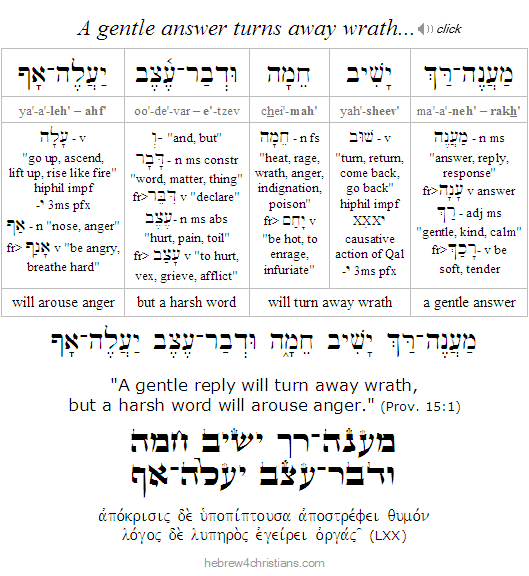 |
"Everything is in the hands of Heaven, except for fear of Heaven" (Berakhot 33b). This idea may be summed up as, "respect precedes Torah" (דרך ארץ קדמה לתורה), since without a basic sense of reverence for life, all that is left to us are painful words of despair... As Abraham Heschel said, "In a controversy, the instant we feel anger, we have already ceased striving for truth and have begun striving for ourselves." The truth needs no defense. If we find ourselves getting defensive or hostile, we need to take a step back and ask ourselves what we really believe... If we seek to use truth as a weapon, or as a means to rationalize our self-will, then we are not "in the truth," even if our facts in the matter may be correct. We must be careful not to find ourselves using the truth for our own agenda. Yeshua's words haunt the heart: "Without me you can do nothing" (John 15:5).
Techno-Fascism
and the rise of the Age of Stupidity...

[ I wrote this last year, but it is more relevant than ever today... ]
12.27.21 (Tevet 23, 5782) In light of the ever-creeping techno-fascism of this evil generation, we wonder how long before politically motivated "censorship" will cross boundaries from various social media platforms to any "offensive content" on any publicly accessible website whatsoever... Indeed this is already happening as we see search engine services delivering filtered results (i.e., "shadow-banning"), Internet browsers tagging web sites as "unsafe," and so on. Moreover, the prevailing characteristic of our age is one of moral and intellectual stupor, and indeed we are now living in what may be called the "Age of Stupidity," a prophesied time wherein God gives worldly culture over to strong delusion - and people are deranged and unfeeling for lack of the truth. It's a perilous time, and for all the more reason should we pray with fervor for the lost to saved before time runs out...
"The Messiah will only come when he is no longer needed" (Franz Kafka), which is to say the Messiah will come when humanity has collectively decided that they no longer want Him. As it was in the days of Noah; as it was in days of Lot (Luke 17:26-30). "When the Son of Man comes, will he find faith on earth?" (Luke 18:8).
Regarding the princes of this world and their various machinations of evil, there is a Scriptural prayer to the LORD God of all power (יהוה אלהים צבאות) that may be offered in times of oppression and persecution by our enemies: "O LORD God, will you not execute judgment? For we are powerless against this great horde that is coming against us. We do not know what to do, but our eyes are upon you" (2 Chron. 20:12).
Hebrew Lesson
2 Chron. 20:12b Hebrew reading (click):
Man of our Sorrows...
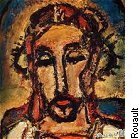
12.27.21 (Tevet 23, 5782) The Lord had compassion for his people as they were suffering in Egypt. The LORD told Moses, "I have surely seen the affliction of my people who are in Egypt and have heard their cry... I know their sorrows" (Exod. 3:7). The grammar here is intense: "seeing I have seen" (רָאה רָאִיתִי). Understand, then, that God surely sees your struggles, friend. Second, know that God heeds the outcry (צְעָקָה) of your heart, and indeed, he interprets your groaning as if it were for the sake of serving him. Your heart's cry is transformed by grace to be the cry for God himself, for relationship with Him: "The cry of the people has come to me," he again told Moses (Exod 3:9), which means all the sufferings, the wrongs, the hopes, the fears, the groans, the despair, the prayers, were present before him, as if he counted every word and sigh. Third, realize that God knows your sorrows; he gathers all your tears into his bottle (Psalm 56:8). The word translated "sorrows" (מַכְאב) is the same used to describe the "Man of sorrows" (אישׁ מַכְאבוֹת), Yeshua our Suffering Servant, who gave up his life to deliver you from darkness, sorrow, and fear (Isa. 53:3-5).
"If there is anywhere on earth a lover of God who is always kept safe from falling, I know nothing of it, for it was not shown to me. But this was shown - that in falling and rising again we are always kept in that same precious love. Between God and the soul there is ultimately no between." - Julian of Norwich
Hebrew Lesson
Exodus 3:7 Hebrew reading (click):
The Breath of Hope...

[ The following is related to our Torah reading for this week, Parashat Va'era... ]
12.27.21 (Tevet 23, 5782) When Moses proclaimed the good news of God's forthcoming redemption for Israel, the Torah states that the people could not listen because they were "short of breath" (Exod. 6:9). Interestingly, this phrase (i.e., mi'kotzer ru'ach: מִקּצֶר רוּחַ) can also mean "lacking in spirit," as if in a paralyzed state of hopelessness. But how did the people become so downhearted? Had they forgotten the promise given to Abraham (Gen. 15:12-14)? Had they disregarded Joseph's final words (Gen. 50:24-25)?
According to some of the sages, part of the reason for their "shortness of breath" (besides the cruel bondage and hard labor imposed on them, of course) was that the Israelites miscalculated the duration of their 400 year exile, and therefore they began to lose hope. When members of the tribe of Ephraim tried to escape from Egypt some 30 years before the time of the redemption, they were all killed by the Philistines, and many of the Israelites began to believe that they would remain as perpetual slaves (Shemot Rabbah, 20:11). They became "short of breath" and could no longer receive the message of the Holy Spirit...
Indeed, life in this evil world can be suffocating at times. And though we may not be under the oppression of a cruel Pharaoh, we are affected by the "princes of this age" who spurn the message of the Messiah's redemption and love, and we are still subjected to bondage imposed by taskmasters who defy the LORD and who seek to enslave us by means of lies, propaganda, and threats of violence... The devil is still at work in the hearts and minds of many of his "little Pharaohs" that govern the world system... The Scriptures make it clear that we are engaged in genuine spiritual warfare: "For we do not wrestle against flesh and blood, but against the rulers, against the authorities, against the cosmic powers over this present darkness, against the spiritual forces of evil in the heavenly places" (Eph. 6:12).
It is evident that one of the central purposes of God's redemption is to bestow freedom and dignity upon his people. As the story of Pharaoh reveals, God does not take kindly to oppressors, dictators, and other megalomaniacal world leaders who deny the truth and who therefore seek to enslave (or kill) human beings created in His image and likeness. Just as God judged Egypt for its oppression and violence, so He will one day break the "rulers of this world" with a rod of iron and dash them in pieces like a potter's vessel (Psalm 2:9-10). The victory is found in our faith, just as the people of Israel believed; "and when they heard that the LORD had visited the people of Israel and that he had seen their affliction, they bowed their heads and worshiped" (Exod. 4:31).
To help us "catch our breath" during this time of waiting, it is important to remember that the LORD redeems us so that we may become His children and therefore be clothed with everlasting dignity... Our redemption makes us heirs of the Kingdom of God and citizens of heaven. We must never regard ourselves as slaves - not to the State, not to the bankers, not to fear, and not to religion (Gal. 5:1). God gave up His Son for us so that we could be made free to live with honor as his dearly loved children.... All the threats of the world system - economic, political, religious, social, etc. - are ultimately made empty and vain by the glorious redemption promised to us in Yeshua our Savior.
Hebrew Lesson
Psalm 27:14 Hebrew reading (click):
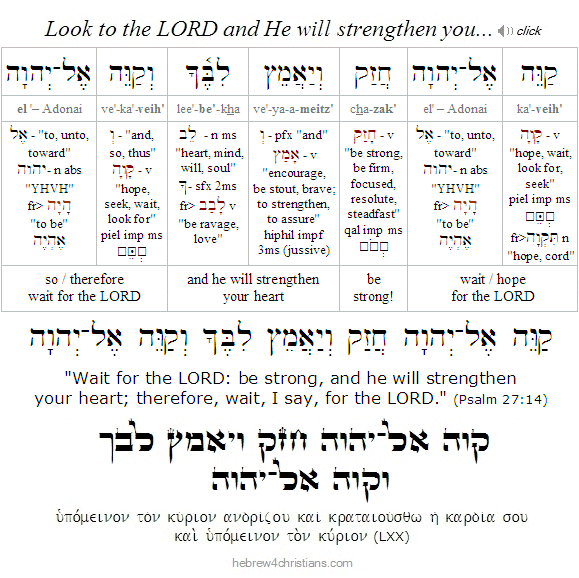 |
Don't let the world system destroy or impugn your hope, chaverim... If the devil can't seduce you with illusory hope or counterfeit joy, he will attempt to oppress you with fear and doubt. Fight the good fight of faith and refuse to succumb to despair. Run the race before you with endurance (Heb. 12:1). Look up, for the time of your deliverance draws near... God redeems us for the sake of His love and honor... It is the "breath of God" that gives us life and courage to face this dark and perverse world (John 20:22). May you be filled with the hope and strength that comes from the Holy Spirit. Amen.
For more see: "The Spirit of Hope: Further thoughts on Va'era."
The Torah of Job...
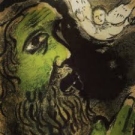
12.26.21 (Tevet 22, 5782) The Book of Job (ספר איוב) teaches us that in the midst of trouble we should not focus on the devil but on God who alone can deliver the soul from evil. In his great struggle not once did Job blame the devil (or other people, or bad luck, etc.) for his woes but he constantly appealed to God for help. Job understood that all that happened to him - the good as well as the bad - came from God, and therefore to God alone he made appeal for solace and deliverance.
Hebrew Lesson
Job 2:10b Hebrew reading (click):
Note: God may not be the "efficient cause" of evil in the world, though he obviously "permits" it and ultimately will overrule it for his own purposes. Job understood this, and throughout his agonizing ordeal he never once blamed others, including Satan, but wrestled with God alone for vindication. Job was "perfect" and "blameless" before the LORD, and in the end, he was indeed vindicated, despite questioning God in the midst of his suffering.
Parashat Va'era - וארא

12.26.21 (Tevet 22, 5782) Happy holidays to you, chaverim. Recall that last week's Torah portion (i.e., parashat Shemot) explained how Moses and Aaron were commissioned to go before Pharaoh and deliver the message: shalach et-ammi (שַׁלַּח אֶת־עַמִּי), "Let my people go" that they may hold a feast to me in the desert" (Exod. 5:1). Not only did Pharaoh dismiss the request, but he imposed even harsher decrees against the Israelites and caused them to suffer miserably. Moses then appealed to the LORD, who reassured him that Pharaoh would eventually relent because "the greater might" of the LORD's power would deliver His people.
Hebrew Lesson
Exodus 5:1b Hebrew reading (click):
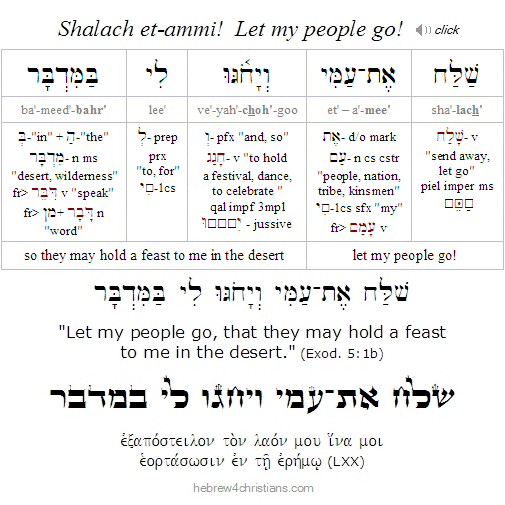 |
In this week's portion, parashat Va'era, (i.e., Exod. 6:2-9:35), the LORD told Moses that He was now going to fulfill His promise to Abraham, Isaac, and Jacob by giving the Israelites the land of Canaan, and that he had heard the "groaning of the people of Israel whom the Egyptians held as slaves" (Exod. 6:5). The showdown between the LORD (יהוה) and the so-called gods of Egypt was imminent, and God therefore encouraged the people with precious promises: "I AM the LORD (אֲנִי יְהוָה) and I will bring you out from under the burdens of the Egyptians, and I will deliver you from their bondage, and I will redeem you with an outstretched arm and with great judgment; and I will take you to me for a people and I will be to you a God" (these are the "four great expressions of redemption" that we recite during our Passover Seder every year).
Despite these promises, however, the people were unable to listen because of their "shortness of breath" (miko'tzer ru'ach: מִקּצֶר רוּחַ) on account of their harsh slavery and afflictions. The LORD then told Moses: "Go in, tell Pharaoh king of Egypt to let the people of Israel go out of his land," and the great showdown between the LORD and the gods of Egypt began. However, even after repeatedly witnessing the series of miraculous plagues issued in the Name of the LORD, the despot remained proud and unmoved, thereby setting the stage for the final devastating plagues upon the land of Egypt and the great Passover redemption of Israel.
Hebrew Lesson
Exodus 6:3 Hebrew reading (with comments):
Who has Ascended and Come Down?

12.24.21 (Tevet 20, 5782) Who is this that is called Wonderful Counselor (פֶּלֶא יוֹעֵץ), the Mighty God (אֵל גִּבּוֹר), the Everlasting Father (אֲבִיעַד), the Prince of Peace (שַׂר־שָׁלוֹם)? Who is this but the One who in love chose to partake our mortal coil to lift us up into eternal life?
Judge not lest you be judged...
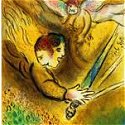
12.24.21 (Tevet 20, 5782) "Judge not, that you be not judged. For with the judgment you pronounce you will be judged, and with the measure you use it will be measured to you" (Matt. 7:1-2). Those who live by the sword shall die by the sword.... Be careful when you judge others, since your judgment says more about you than the matter being judged. You can be "right" for all the wrong reasons; you can be intellectually on point but spiritually far afield; you can speak the "truth" and yet be the mouthpiece of the devil...
Hebrew Lesson:
Prov. 19:11 Hebrew reading (click):
Confession of our Hope...

12.24.21 (Tevet 20, 5782) It is written: "Faith is the foundation (i.e., ὑπόστασις: the "substance," reality, being, etc.) of hope, the conviction of the unseen... Without faith it is impossible to please God, for whoever would draw near must believe that God exists and rewards (μισθαποδότης) those who seek him" (Heb. 11:1,6). Note that God is pleased when we seek his presence, that is, when we look past the ephemera and ambiguity of the phenomenal world for the truth about spiritual reality. For our part, faith depends on confession. We must say that we believe, and affirm it with all our heart (Rom. 10:9), as it says, "I will make Your faithfulness known with my mouth" (Psalm 89:2). When you encounter tribulation, or experience some crisis of faith, reaffirm aloud: "I believe in God's promise..." Physically expressing your faith is itself an act of faith, and this encourages your soul to trust in God's healing reward even in the present struggle or darkness.
One of the more difficult tests of faith is learning to "endure yourself" as your inner character is being transformed by the mercy of God... To do so, you must receive the miracle of life in Yeshua (1 John 5:12). Again you must look beyond the realm of appearance, where the "outward man" perishes, to the realm of ultimate healing, where the "inward man" is finally liberated from the ravages of sin and death. This is the comfort we have in our affliction: God's promise revives our hearts to say, "I know that my Redeemer lives, and at the last he will stand upon the earth" (Job 19:25). Even in the "shadow of the valley of death" (i.e., this moribund and broken world), the LORD is with us and comforts us with His Presence (Psalm 23:4). We are given this great promise: "Just as we have borne the image of the man of dust, we shall also bear the image of the man of heaven" (1 Cor. 15:49).
Dear Lord, in the worst of our moments, thank you for seeing the Savior within us; thank you for heeding the groaning of hope that your Spirit of compassion imparts.... "When my heart was embittered, when I was pierced in heart, I was brutish and ignorant; I was like a beast toward you. Nevertheless, I am always with you; You hold my right hand" (Psalm 73:21-23). Despite this lament, however, the psalmist affirmed that he was always with God - notwithstanding his ignorance, his complaint of heart, his doubts, fears, and so on... God is not driven away by our pain and confusion, but on the contrary, he takes us by the hand and will not let go: "It was I who taught Ephraim to walk; I took them up by their arms, but they did not know that I healed them" (Hos. 11:3).
Hebrew Lesson:
Job 19:25 Hebrew reading (click):
Of course it's not always easy to wait for God, especially when we are in pain or anxiety, but we must never, ever, give up; we must never ever, abandon our heart's longing for ultimate healing. Therefore the Spirit cries out: come alive and trust in the promise of God; receive the heavenly gift. Ve'yesh tikvah le'acharitekh (וְיֵשׁ־תִּקְוָה לְאַחֲרִיתֵךְ): "There is hope for your future," declares the LORD (Jer. 31:17). "Blessed are you, LORD our God, King of the universe, who makes us prisoners of hope" (אֲסִירֵי הַתִּקְוָה). Friends, Let us hold fast the confession of our hope without wavering, for he who promised is faithful" (Heb. 10:23).
God Knows your Name...

12.24.21 (Tevet 20, 5782) The Book of Exodus begins, ve'eleh shemot (וְאֵלֶּה שְׁמוֹת), "and these are the names" (of the children of Israel). God calls each person by name to make the journey... The Creator of all things (הבורא של הכל) calls each star by its own name (Gen. 22:17, Psalm 147:4) and yet He also knows each lily of the field and sparrow that flutters its wings (Matt. 6:28-30, 10:29). As Yeshua said, even the hairs on your head are all numbered (Matt. 10:30). In Jewish theology, the term hashgachah pratit (הַשְׁגָּחָה פְּרָטִית) refers to God's personal supervision of our lives (hashgachah means "supervision," and pratit means "individual" or "particular"). Since God is the Master of the Universe, His supervision and providence reaches to the smallest of details of creation - from subatomic particles to the great motions of the cosmos. Of particular interest, however, are those whom He created be'tzelem Elohim: in His image and likeness. The LORD is called אלהֵי הָרוּחת לְכָל־בָּשָׂר / Elohei ha-ruchot lekhol-basar: "The God of the spirits of all flesh" (Num. 16:22), and that means that every spirit ultimately answers to Him.
We find great comfort when we understand that God has complete authority over categorically everything in the universe -- including our ultimate welfare (John 10:27-28). When we pray to the LORD God of Israel, we intuitively understand that He is completely sovereign and Lord over all things... All power, glory, authority, and dominion is His alone, and all that is in the heaven and in the earth is His (1 Chron. 29:11-12). We do not worry that He is incapable of handling our troubles or that He is unable to help us. No, we acknowledge that the God most High (אֵל עֶלְיוֹן) sustains all things by the Word of His power (Col. 1:17). He is "the blessed and only Sovereign, the King of kings (מֶלֶךְ הַמְּלָכִים) and the Lord of lords" (1 Tim. 6:15). Whenever we think clearly in light of the revelation of Scripture, we apprehend the truth about God's sovereign glory and power...
Hebrew Lesson:
Psalm 139:7 Hebrew reading (click):
Through the Wound...
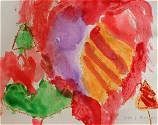
12.23.21 (Tevet 19, 5782) "Find God or die" is a slogan for those who are desperate for deliverance. Many of us have felt abandoned at some time, perhaps because of a tragic event that happened when we were vulnerable or unable to defend ourselves. The painful message implied in any kind of abandonment is, "You are not important; you are not of value." Because of this, we may endlessly search for approval from others, even supposing that God's very love is conditional... We may be tempted to engage in "magical thinking" that God can be bribed with ritual acts or flattery. Part of the healing process is to discover that God comes "through the wound." Despite the pain of our past, we come to trust that all of our life is redeemed, not only that which we can accept, but also that which we can do nothing but agonize and protest. God's grace goes there, too. Yeshua said, "I will not leave you comfortless: I will come to you... Because I live, you shall live also" (John 14:18-19). Amen, the promise of God says: "You shall not die, but live, and declare the works of the Lord" (Psalm 118:17). God will wipe away your tears, friend...
Hebrew Lesson:
Psalm 118:17 Hebrew reading (click):
Yom Kippur and Christmas...

12.23.21 (Tevet 19, 5782) If the priest Zechariah was performing the Yom Kippur avodah when he was visited by the angel Gabriel (as seems to be the case given the context, see Luke 1:8-23), and if his wife Elizabeth conceived about that time (see Luke 1:24, that is, sometime in the middle of the month of Tishri), and her cousin Mary was then told of the incarnation six months later, during Passover season (Luke 1:26, 36), then the birth of Yeshua could have been sometime during the middle of the month of Tevet, which is indeed close to the traditional December 25th date observed by the majority of Christians...
After all, as you read the the prophetic announcement of the birth of John given in Luke, it certainly seems that Zechariah was performing the Yom Kippur ritual at the Temple, offering incense before the parochet before he entered the sacred chamber of the Holy of Holies. Indeed, one implication of this interpretation is that the Lamb of God (שׂה הָאֱלהִים) was conceived during Passover, which seems appropriate as the time of the Incarnation...
ὁ λόγος σὰρξ ἐγένετο καὶ ἐσκήνωσεν ἐν ἡμῖν -- "The Word became flesh and dwelt among us" (John 1:14) -- which of course is the essence of the gospel message. As it is written concerning the birth of Messiah: "For unto us a child is born, unto us a son is given: and the dominion shall be upon his shoulder; and his name shall be called 'Wonderful Counselor,' 'the mighty God,' 'the everlasting Father,' 'Prince of Peace'" (Isa. 9:6).
Hebrew Lesson:
Isaiah 9:6 Hebrew reading lesson (click):
Of course the exact date of Yeshua's birth is existentially irrelevant, apart from the fact that he indeed was born into this world as our Savior, and indeed, the New Testament stresses the significance of his death more than his birth (1 Cor. 2:2; 1 Cor. 15:3-4). Nevertheless, we use the "good eye" to regard our Christian friends who honor this time to remember the birth of Yeshua, even if we have convictions that may lead us to think Messiah was born during Sukkot. For some hopefully peaceful discussion about the birth date of the Messiah Yeshua, see the article, "Christmas: Was Jesus really born on December 25th?"
Note: The point of this entry was to explore the traditional date as a possibility, not to be dogmatic and intolerant. You certainly do not have to agree with the traditional date, of course, though if you disagree, then you should at least address the pertinent question of what Zechariah was doing in his service when the prophecy of the birth of John was made. Follow your own convictions and walk in peace toward all people (Heb. 12:14). Shalom.
Hebrew Lesson:
Isaiah 7:14b Hebrew reading lesson (click):
The Word Made Flesh....
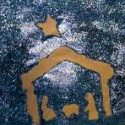
[ This time of year provides an opportunity to focus on the truth of incarnational theology, to celebrate the revelation of God in Yeshua, and to proclaim the miracle that God "emptied Himself" by being clothed in human flesh as the great Lamb of God.... ]
12.22.21 (Tevet 18, 5782) At Mount Sinai we heard the voice of God (קוֹל אֱלהִים) speaking from the midst of the Fire (Deut. 4:33), an event that foreshadowed the great advent of the King and Lawgiver Himself, when the Eternal Word (דְבַר־יְהוָה) became flesh and dwelt with us (Phil. 2:6-7; John 1:1,14). Any theology that regards God as entirely transcendent (i.e., God is beyond any analogy with the finite) will have a problem with divine immanence (i.e., God is inherent and involved within the finite), since the highness, holiness, and perfection of God will make Him seem distant, outside of us, far away, and unknown... Incarnational theology, on the other hand, manifests the magnificent humility and nearness of God to disclose the divine empathy. Indeed, the LORD became Immanuel (עִמָּנוּ אֵל), "God with us," to share our mortal condition, to know our pain, to experience the wounds of sin, and to be abandoned, alienated, forsaken. It is God's own bittul hayesh (בִּטּוּל הַיֵּשׁ) - his self-nullification for the sake of love and truth. The "Eternal made flesh" bridges the gap between the realm of Ein Sof (אין סוף), the infinitely transcendent One, and the finite world of people lost within their sinful frailty. Of course we believe Adonai Echad (יְהוָה אֶחָד) - that the "LORD is One" - both in the sense of being exalted over all things but also in the sense of being compassionately involved in all things (Rom. 11:36). We therefore celebrate the giving of the Torah both at Sinai and especially at Bethlehem with the birth of Messiah. We celebrate that God is indeed the King and Ruler over all, but we further affirm that God's authority and rule extends to all worlds - including the realm of our finitude and need...
As I've mentioned elsewhere, the climax of Sinai was the revelation of the Sanctuary. The two tablets of the law, summarizing the Ten Commandments, were stored inside the famous Ark of the Covenant (אֲרוֹן בְּרִית־יְהוָה), a sacred "three-in-one" box placed in the innermost chamber of the Tabernacle called the Holy of Holies (קדֶשׁ הַקֳּדָשִׁים). As such, the Ark served as kisei ha-kavod (כִּסֵּא הַכָּבוֹד), the Throne of Glory itself. Upon the cover (or crown) of the Ark (i.e., the kapporet) were fashioned two cherubim (i.e., angel-like figures) that faced one another (Exod. 25:17-18). According to the Talmud (Succah 5b), each cherub had the face of a child - one boy and one girl - and their wings spread heavenward as their eyes gazed upon the cover (Exod. 25:20). It was here that God's Voice would be heard during the Yom Kippur service, when sacrificial blood was sprinkled upon the crown to symbolize the atonement of sin secured through Messiah, the Word that became flesh for us... In the very heart of the Sanctuary, then, we see the Word of God and the sacrficial blood.
The LORD God Almighty was clothed with human skin: our flesh, our bones... The miracle of the incarnation is the Absolute Paradox, as Kierkegaard said, wherein the infinite and the finite meet in mystery of the Divine Presence. Here God "touches a leper," eats with sinners and prostitutes, sheds human tears, and suffers heartache like all other men... The gloriously great God, the very Creator of the cosmos, has "emptied Himself" to come in the form of a lowly servant (δοῦλος) - disguised to the eyes of the proud and hardhearted, but is revealed as High Priest to those who are genuinely broken and in profound need. The LORD God is God over all possible worlds, and that includes both the celestial realms of the heavens but also the world of the fallen, the ashamed, the alienated, and the lost... God's infinite condescension reveals and augments the majesty of His infinite transcendence. There is no world - nor ever shall there be such - where the LORD God Almighty does not reign and have preeminence.
Do not suppose for a moment that the Torah of Moses does not teach "incarnational" theology. Since God created human beings in his image and likeness, the "anthropomorphic language" of Scripture is meaningful. The LORD reveals himself in human terms - using human language, expressing human emotions, and so on, as it says: Moses spoke to God panim el panim - "face to face" (Deut. 34:10). The Torah always has to take on human form - the Word made flesh - for the sake of human beings who live in flesh and blood reality...
The greatest expression of God's word is found in the Presence of Yeshua. This is the Word of God that "tabernacles" with us, full of grace and truth (John 1:14). Yeshua is the "Living Torah," Immanuel (עִמָּנוּ אֵל), "God with us," who enters our world to rescue us from death. Our Scriptures state that "in these last days God has spoken to us by his Son, whom He appointed the Heir of all things, through whom also He created the worlds" (Heb 1:2). Note that the Greek construction for the phrase translated, "by his son" is ἐλάλησεν ἡμῖν ἐν υἱῷ, which literally means "he spoke to us in Son" -- that is, in the language or voice of the Son of God Himself... God speaks the language "of Son" from the midst of the fire revealed at Zion. "Therefore, since we are receiving a kingdom that cannot be shaken, let us be thankful, and so worship God acceptably with reverence and awe (μετὰ αἰδοῦς καὶ εὐλαβείας) - for our God is Esh Okhelah - a Consuming Fire" (Heb. 12:28-29).
Hebrew Lesson:
Isaiah 7:14b Hebrew reading lesson (click):
Addendum: Consider further the metaphorical and anthropomorphic language of the Scriptures: God "sees," God "hears," the "hand of the LORD" saves, etc. Without an implied incarnational theology, there would be no language that we could comprehend about God who is the Infinite One that transcends all things... God gets angry; God feels sorrow; God is jealous; God is a lover, etc. all these metaphors bring the language of heaven into the world of humanity... The Spirit that imparts revelation does so inside a human brain and is translated into human apprehension. Yeshua is the Substance of the shadowy talk of analogical language; he embodies God-life before us.... Yeshua is the Word of God made flesh -- able to touch us, know us, share in our suffering, heal us of our sin-sickness, etc.
H4C Podcast:
Centrality of Exodus...
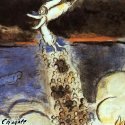
[ This week we begin rereading the Book of Exodus for the current Jewish year... ]
12.22.21 (Tevet 18, 5782) The exodus from Egypt (i.e., metziat mitzrayim: יציאת מצרים) is perhaps the most fundamental event of Jewish history; it is "the" miracle of the Torah. In addition to being commemorated every year during Passover (Exod. 12:24-27; Num. 9:2-3; Deut. 16:1), it is explicitly mentioned in the first of the Ten Commandments (Exod. 20:2), and it is recalled every Sabbath (Deut. 5:12-15). The festivals of Shavuot (Pentecost) and Sukkot (Tabernacles) likewise derive from it (the former recalling the giving of the Torah at Sinai and the latter recalling God's care as the Exodus generation journeyed from Egypt to the Promised Land), as does the Season of Teshuvah (repentance) that culminates in Yom Kippur (the Day of Atonement). Indeed, nearly every commandment of the Torah (including the laws of the Tabernacle and the sacrificial system) may be traced back to the great story of the Exodus, and in some ways, the entire Bible is an extended interpretation of its significance. Most important of all, the Exodus both prefigures and exemplifies the work of redemption given through the sacrificial life of Yeshua the Messiah, the true King of the Jews and the blessed Lamb of God...
The deeper meaning of exile concerns blindness of the divine presence. The worst kind of exile is not to know that you are lost, away from home, in need of redemption... That is why Egypt (i.e., Mitzraim) is called metzar yam - a "narrow strait." Egypt represents bondage and death in this world, and the exodus represents salvation and freedom. God splits the sea and we cross over from death to life. Since Torah represents awareness of God's truth, Israel was led into a place of difficulty to learn and receive revelation (Gen. 46:1-7). Out of the depths of darkness God's voice would call his people forth. Likewise we understand our "blessed fault," the trouble that moves us to cry out for God's miracle in Yeshua... Indeed the New Testament states that Yeshua "appeared in glory and spoke of his exodus (τὴν ἔξοδον αὐτου) which he would accomplish at Jerusalem" (Luke 9:31).
 |
Out of the Straits...

[ The following is related to our Torah reading for this week, Parashat Shemot... ]
12.22.21 (Tevet 18, 5782) The name for ancient Egypt in Hebrew is "mitzrayim" (מִצְרַיִם) a word that can be translated as "straits" or "narrow places" (i.e., -מ, "from," and צַר, "narrow"), suggesting that "Egypt" represents a place of constriction, tribulation, oppression, slavery, and despair. The Hebrew word for salvation, on the other hand, is "yeshuah" (יְשׁוּעָה), a word that means deliverance from restriction, that is, freedom and peace. As it is written: "From my distress (מִן־הַמֵּצַר), i.e., from "my Egypt," I cried out to the LORD; the LORD answered me and set me in a wide open place" (Psalm 118:5).
But why, it may be asked, did God tell Jacob: "Do not be afraid to go down to Egypt" (Gen. 46:3)? Why did God allow this excursion into "heavy darkness" that Abraham dreadfully foresaw (Gen. 15:12-13)? What is there about Egypt that prepares us to take hold of our promised inheritance? Joseph become a prince of Egypt; however, he was still captive to Pharaoh, and later, after he died, a "new Pharaoh arose" that did not acknowledge his contribution to Egyptian history (Exod. 1:8). All that remained of Joseph were his bones that were carried out by Moses (and later buried by Joshua in Shechem). The "bare bones" of Joseph represented the essence of his faith, as he foresaw the time when God would rescue the family from Egypt and raise him up in the land of promise (Gen. 50:24-26; Heb. 11:22).
A general principle of spiritual life is that the "the way up is the way down" (John 12:24). As Yeshua said, "Whoever would be first among you must be slave of all" (Mark 10:44). Becoming nothing (i.e., ayin) in this world is the condition for seeing something in the world to come. Unless a seed falls to the ground it abides alone (John 12:24). But we become "nothing" by trusting in the promise of God, not by trying to do it ourselves... This is not another venture of the ego. Life in the Spirit means trusting that God will do within you what you cannot do for yourself... We can only take hold of what God has done for us by "letting go" of our own devices (Phil. 2:13). When we let go and trust, we will be transformed, carried by the "Torah of the Spirit of life" (i.e., תּוֹרַת רוּחַ הַחַיִּים, Rom. 8:2), The way is not trying but trusting; not struggling but resting; not clinging to life, but letting go...
God's way of deliverance is entirely different than man's way. Man tries to enlist carnal power in the battle against sin (i.e., religion, politics, etc.), but God's way is to remove the flesh from the equation. The goal is not to make us stronger and stronger, but rather weaker and weaker, until the ego is crucified and only the sufficiency of the Messiah remains. Then we can truly say, "I have been crucified with Messiah. It is no longer I who live, but the Messiah who lives in me. And the life I now live in the flesh I live by faith in the Son of God, who loved me and gave himself for me" (Gal 2:20). The word "Hebrew" (עִבְרִי) means one who has "crossed over" (עָבַר) to the other side, as our father Abraham did when he left the world of Mesopotamia (Gen. 14:13). Likewise it is on the other side of the cross that we experience the very power that created the universe "out of nothing" (i.e., yesh me'ayin: יֵשׁ מֵאַיִן) and that raised Yeshua the Messiah from the dead.
Hebrew Lesson
Psalm 118:5 Hebrew reading (click):
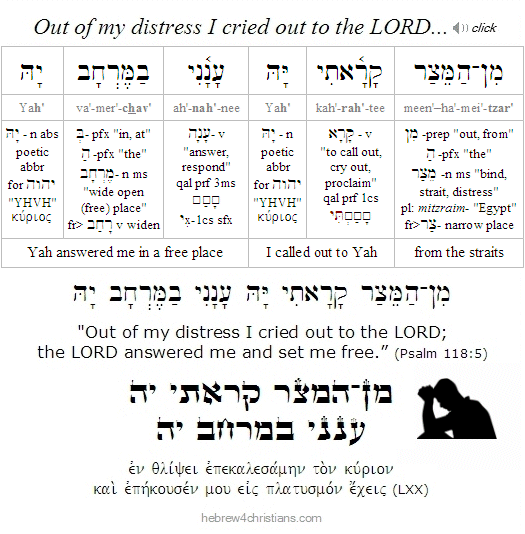 |
More than Conquerors...

12.22.21 (Tevet 18, 5782) Don't allow worldly propaganda to define what reality is for you... Though you may feel disheartened and exasperated over the state of the political schemes of human beings, remember that the light of our God shines forth in resplendent glory; his power is unrivaled, and his love endures forever... Our God works all things together for good; "indeed, the LORD of all power (יהוה צבאות) has a plan, and who can possibly frustrate it? His hand is ready to strike, and who can possibly stop it?" (Isa. 14:27). Amen, as it is written: "There is no wisdom nor understanding nor counsel that can prevail against the LORD" (Prov. 21:30). So take heart: be strong and of good courage. Do not be afraid even if an army encamps against you; be confident even though war rises in this hour (Psalm 27:3). Walk in the Light of God's Presence and be confident of his blessing. Do not be afraid and do not be dismayed, for the Lord your God is with you wherever you go!
Hebrew Lesson
Proverbs 21:30 Hebrew reading (click):
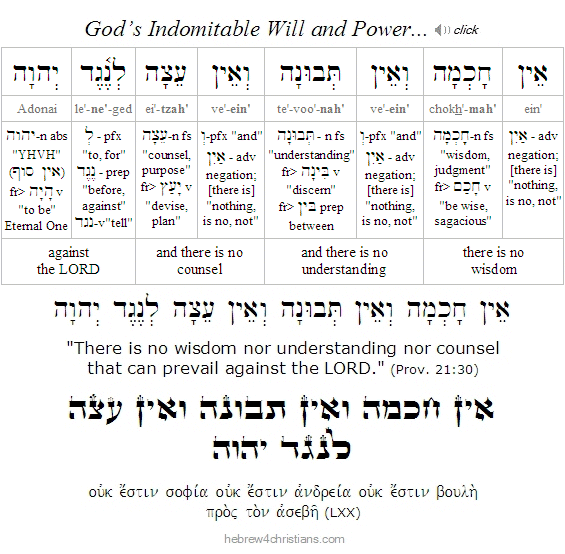 |
Faith's New Song of Praise...

12.21.21 (Tevet 17, 5782) Dietrich Bonhoeffer once famously wrote: "When Christ calls a man, he bids him come and die," and while that is of course true, it is also important to remember that he also bids him come and live, too... "Unless the seed dies, it abides alone, but if it dies, it brings forth much fruit" (John 12:24). We descend in order to ascend. The "infinite resignation" of putting off the old nature is meant to be supplanted by Yeshua's overcoming life within our hearts. Soren Kierkegaard likens the life of faith to Abraham's heart that was able to receive back his son Isaac after he offered him up in sacrifice. After we take the step of surrender we receive back from the LORD, though everything is made new...
Hebrew Lesson
Isa. 42:10a Hebrew reading (click):
The Love of Truth...
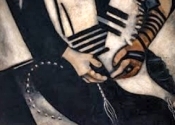
12.21.21 (Tevet 17, 5782) Christian (and Jewish) theology insists that truth matters, and knowing the truth about God is absolutely essential for life itself. Nothing is more important; nothing more vital. "This is eternal life (חַיֵּי עוֹלָם), that they may know you, the only true God (אֶל־אֱמֶת), and Yeshua the Messiah (יֵשׁוּעַ הַמָּשִׁיחַ) whom you have sent (John 17:3). The truth sets us free; it is the unbreakable seal that bears witness of reality. In the Gospel of John it is recorded that Yeshua said, "I am the way, the truth, and the life" (i.e., ᾽Εγώ εἰμι ἡ ὁδὸς καὶ ἡ ἀλήθεια καὶ ἡ ζωή). The Greek word translated "truth" in this verse is aletheia (ἀλήθεια), a compound word formed from an alpha prefix (α-) meaning "not," and lethei (λήθη), meaning "forgetfulness." (In Greek mythology, the "waters of Lethe" induced a state of oblivion or forgetfulness.) Truth is therefore a kind of "remembering" something forgotten, or a recollecting of what is essentially real. Etymologically, the word aletheia suggests that truth is also "unforgettable" (i.e., not lethei), that is, it has its own inherent and irresistible "witness" to reality. In that sense light is a metaphor for truth: "The light shines in the darkness, and the darkness has not overcome it" (John 1:5). There can be no truth apart from moral reality. People may lie to themselves, but truth has the final word.
Greek scholars further note that the word lethei itself is derived from the verb lanthano (λανθάνω), which means "to be hidden," so the general idea is that a-letheia (i.e., truth) is non-concealment, non-hiddenness, or (put positively) revelation or disclosure. Thus the word of Yeshua - His message, logos (λόγος), revelation, and presence - is both "unforgettable" and irrepressible. Yeshua is the Unforgettable One that has been manifest as the express Word of God (דְּבַר הָאֱלהִים). Yeshua is the Light of the world (אוֹר הָעוֹלָם) and the one who gives us the "light of life" (John 8:12). Though God's message can be suppressed by evil and darkened thinking, the truth is self-evident and intuitively certain (see Rom. 1:18-21).
We have a moral imperative, given by God Himself, to receive the truth and to live according to the nature of spiritual reality. Those who reject or suppress the truth, however, are responsible for their actions, as it is written, "No one who practices deceit shall dwell in My house; no one who utters lies shall stand before my eyes" (Psalm 101:7).
Hebrew Lesson
Psalm 101:7 Hebrew reading (click):
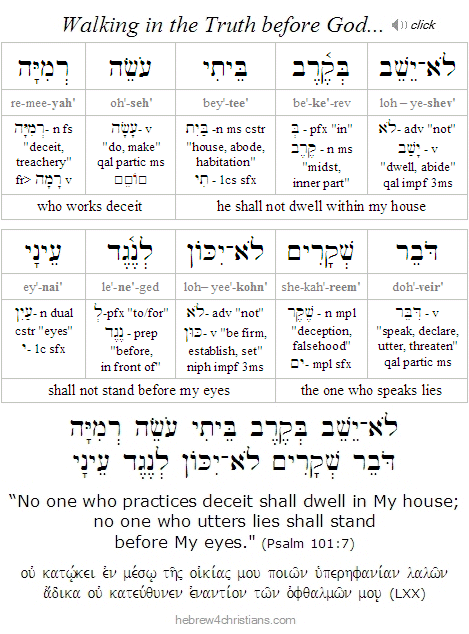 |
Seeming and Knowing...

12.21.21 (Tevet 17, 5782) "There is a way that seems right to a person, but its end is the way of death" (Prov. 16:25). The spiritual danger here is that the way that seems right; as if all is well, and yet it leads to death... Oh the dread of ever hearing: "I never knew you (לֹא יָדַעְתִּי אתה); depart from me you who practice lawlessness" (Matt. 7:23).
It is lawlessness (ἀνομία) to reject the Torah of God that commands us to follow Messiah and know him in all our ways - including the ways of our struggles, our calls for justice, and so on... "Justice, justice you shall pursue" (צֶדֶק צֶדֶק תִּרְדּף) implies that any means to justice must be just themselves. Indeed Yeshua plainly warned us that those who willfully reject moral sense do not know him and therefore will be judged as outsiders of the truth of God. The way of the LORD (דֶּרֶךְ יְהוָה) is "to show mercy and judgment (Gen. 18:19). Amen. "If you know that He is righteous, you may be sure that everyone who practices righteousness (πᾶς ὁ ποιῶν τὴν δικαιοσύνην) has been born of him" (1 John 2:29).
As Yeshua plainly testified before Pilate: "For this purpose I was born and for this purpose I have come into the world -- to bear witness to the truth. Everyone who is of the truth listens to my voice" (John 18:37). "Blessed are those who wash their robes, so that they may have the right to the Tree of Life and that they may enter the city by the gates. Outside are all those who love and practice the lie..." (Rev. 22:14-15).
Hebrew Lesson
Prov. 16:25 Hebrew reading (click):
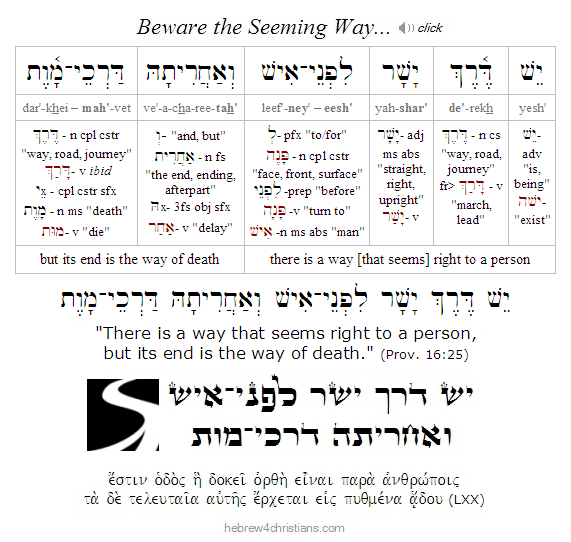 |

"These are the Names..."
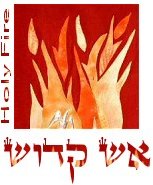
[ The following is related to our Torah reading for this holiday week, Parashat Shemot... ]
12.21.21 (Tevet 17, 5782) Perhaps it was because Moses was "heavy of mouth and of tongue (i.e., kavad-peh u'khevad lashon: כְּבַד־פֶּה וּכְבַד לָשׁוֹן) that he repeatedly objected to the role of being God's emissary and spokesman. Moses was unsure of himself. What would he say to the learned elders of Israel if he were tested by being asked what God's Name was? It is revealing to understand that the LORD's reply: אֶהְיֶה אֲשֶׁר אֶהְיֶה / "Eheyeh Asher Eheyeh ('I will be what I will be') was connected with the God of the patriarchs: "Say this to the people of Israel, 'I AM (אֶהְיֶה) has sent me to you.'" Then God went on to state the connection: "Say this to the people of Israel, 'The LORD (יהוה), [namely] the God of your fathers, [namely] the God of Abraham (אֱלהֵי אַבְרָהָם), [namely] the God of Isaac (אֱלהֵי יִצְחָק), and [namely] the God of Jacob (אֱלהֵי יעֲקב), has sent me to you.' This is my name forever (זֶה־שְּׁמִי לְעלָם), and this is my memorial throughout all generations" (Exod. 3:15). The great I AM, the LORD whose name is "Incomprehensibly Wonderful" is none other that the God of Israel (אלוהי ישראל), the very One who revealed His truth to the fathers of Israel...
Hebrew Lesson
Exodus 3:15 Hebrew reading (click):
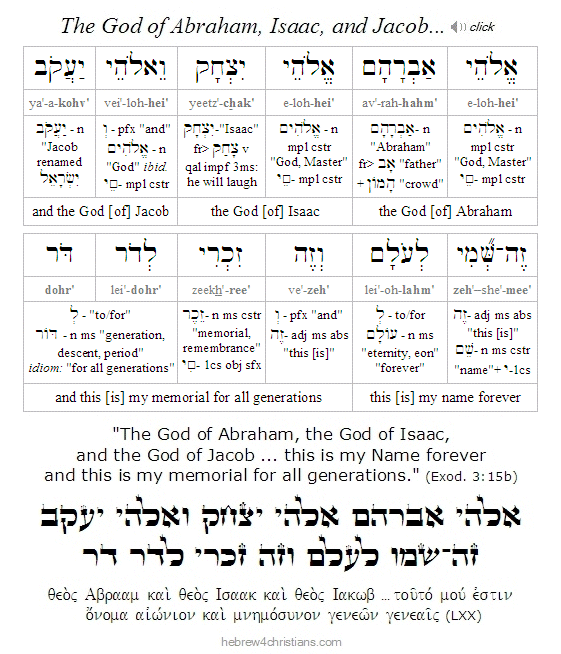 |
Recall the distinct Names of God mentioned in the famous encounter at the burning bush (i.e., יהוה, אֱלהִים, מַלְאַךְ יהוה, and so on) all referred to the One true LORD God of Israel, the Maker of Heaven and earth. In other words, there is a direct connection between the Name of the LORD (שׁם־יהוה) and Being and Reality (הוויה ומציאות) itself... YHVH is the Source of all being and has being inherent in Himself (i.e., He is "necessary" Being); everything else is contingent being that derives existence from Him (He is the "Source that has no source," as Aquinas once said). Indeed the name YHVH also bespeaks the utter transcendence of God: since He is beyond the limitations of space and time, He is fully aware of all things and his word is therefore entirely reliable and true. His name is Faithful and True (Rev. 19:11). In his essence, God is beyond all "predications" or attributes of language: He is the Source and Foundation of all possibility of utterance and thus is beyond all definite descriptions. Hence the LORD is sometimes simply called HaShem, "the Name," since no amount of verbiage can do justice to the infinite majesty and truth of His Life.
People who get anxious about the Name of God miss the point... As I've said before, God is "Presence" (Exod. 3:13-14), "Breath" (Gen. 2:7; Num. 16:22), "Life" (Deut. 30:20), "Love" (Exod. 34:6-7), and the "I-AM-WITH-YOU One" who keeps His promises. The Name YHVH (יהוה) means that "God was (i.e., hayah: היה), God is (i.e., hoveh: הוֶה), and God always will be (i.e., veyihyeh: וְיִהְיֶה)," which implies that He is ever present and not restricted by time or space. His Name is Eternal Life (חַיֵּי עוֹלָם). Moreover, God is called havayah (הֲוָיָה), which means He sustains creation by the Word of His power: "In Him we live, move, and have our being" (Acts 17:28; Heb. 1:3). Most important, though, from the point of view of our heart, is the Name Yeshua taught us to call upon God, namely "Abba, Father..." We know the name of God when we trust He is our beloved heavenly Father, and that we are his beloved child...
Note: For more, see "Shemot: Divine Names Theology" and "Using the Name in Vain."
New Pharaoh's Dream...
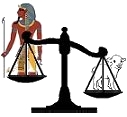
[ The following is related to our Torah reading for this week, Parashat Shemot... ]
12.21.21 (Tevet 17, 5782) According to midrash, just as the Pharaoh during the time of Joseph was troubled by his dreams (Gen. 41:1-7), so was the "new king" that arose during the time of Moses. In the new Pharaoh's dream, an old man was standing before him as he sat on his throne, holding a balance in his hand. The old man placed all the nobles and governors of Egypt on one side of the balance, and on the other side, he placed one small lamb. To Pharaoh's astonishment, however, the lamb outweighed all the leaders of Egypt! When the king asked his advisors to interpret the dream, they said it foretold of a coming king who would overthrow the kingdom of Egypt and set the Israelites free. This coming one would excel in wisdom and his name would be remembered forever as the Savior of Israel.
Of course the rest of the Book of Exodus is essentially God's interpretation of the new Pharaoh's dream, as the great events of the Exodus would reveal. The LORD God of Israel forewarned this king that Egypt would come into judgment by the Lamb of God... Indeed, the only way to escape this judgment and the wrath of God was by being covered by the sacrificial blood of the lamb... The Lamb of God is central to Israel's deliverance and becomes the focal point of the revelation of the sanctuary later given at Sinai.
Israel was redeemed from Egypt by trusting in the promise of their deliverance, as it is written, "and the people believed" (וַיַּאֲמֵן הָעָם) ... and bowed their heads and worshiped" (Exod. 4:31). Recall that the blood of the korban Pesach - the Passover lamb - was to be smeared on the two sides and top of the doorway, resembling the shape of the letter Chet (ח). This letter, signifying the number 8, is connected with the word חי (chai), short for chayim (life). The blood of the lamb (דַּם הַשֶּׂה) not only saves from the judgment of death, but it also is the means of imparting divine life and power...
Hebrew Lesson
Psalm 72:18 Hebrew reading (click):
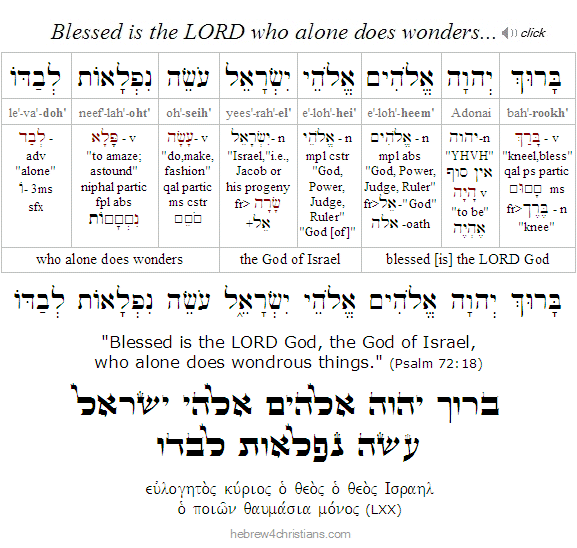 |
The Sigh of Faith...
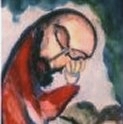
12.20.21 (Tevet 16, 5782) "We groan inwardly as we eagerly await our redemption..." (Rom. 8:23). We sigh deeply because we are suspended between two worlds, living in the ambiguity of an already-not-yet expectation, enduring ourselves as imperfect vessels longing for perfection, trapped between what is and what will be, seeing the unseen, yearning for healing, believing that we shall never die, even as we die (John 11:26). We are restless for our eternal home and long for God's presence as we walk through shadowy vales, facing various temptations, whispering our prayers in the dark. And though we must learn endurance and trust in God's sovereign purposes, our faith nevertheless compels us to cry out, "How long, O Lord?" and "Come, Lord Yeshua" (Rev. 22:20).
Our ongoing challenge is to keep a steadfast attitude despite the struggles we face, and therefore we inwardly pray: "Renew within me ruach nachon (רוּחַ נָכוֹן) - "a spirit that says Yes" (Psalm 51:10). Surrender means accepting God's will for our lives -- saying "yes" to the promise of love, even if we presently feel empty inside and wonder how long we can hang in there... Saying "yes" implies saying "no" to other things - no to fear, anger and doubt, for example. Tragically there are people who have given up hope for bitterness and despair. Asking God to give us a spirit of "yes" is really a prayer for focus, direction, and the willingness to keep pressing on to our heavenly destiny.
Though life is a struggle, we do not lose heart or faint, since even if the outer self is wasting away, our inner self is being renewed day by day. "For this light momentary affliction is preparing for us an eternal weight of glory beyond all comparison, as we look not to the things that are seen but to the things that are unseen. For the things that are seen are transient, but the things that are unseen are eternal. For we know that if the tent that is our earthly home is destroyed, we have a building from God, a house not made with hands, eternal in the heavens. For in this tent we groan, longing to put on our heavenly dwelling, that is, substance and reality..." (2 Cor. 4:16-5:3).
Hebrew Lesson:
Psalm 50:10 Hebrew reading (click):
The Wise Still Seek Him...

12.20.21 (Tevet 16, 5782) "A Star shall lead from of Jacob..." Amazingly, the pagan seer Balaam – who may have been the forebear of the "magi of the east" (Matt. 2:1-2) – foresaw the coming of the Messiah: "I see him, but not now; I behold him, but not near: a Star shall lead from Jacob (דָּרַךְ כּוֹכָב מִיַּעֲקב), and a Ruler shall arise from Israel" (Num. 24:17). Balaam's prophecy described the coming of the Messiah and his reign in two distinct aspects: "A star from Jacob shall lead the way (i.e., דָּרַךְ)," this refers to Messiah's first coming as the way of life (John 14:6), "and a scepter (i.e., Ruler) shall ascend (וְקָם שֵׁבֶט) from Israel," this refers to Messiah's second coming to establish the kingdom after the final redemption.
דָּרַךְ כּוֹכָב מִיַּעֲקב
וְקָם שֵׁבֶט מִיִּשְׂרָאֵל
dah·rakh · koh·khav · mee·ya·a·kohv
ve·kahm · she'·vet · mee·yees·rah·el

"A Star shall lead from Jacob,
and a Ruler shall rise from Israel.
(Num. 24:17)

Hebrew Lesson:
Numbers 24:17b Hebrew reading lesson (click):
As I mentioned the other day, the very purpose and goal of salvation is for us "to turn from darkness to light and from the power of Satan to God" (Acts 26:18). Hashivenu, Adonai... When the darkness seems to enshroud your way, pray for God's light to be rekindled within your soul. Happy holidays and love to you, friends.
Humility of the Messiah...
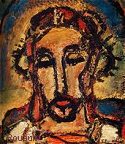
[ This time of year gives us an opportunity to focus on the truth of incarnational theology, to celebrate the revelation of God in Yeshua, and to proclaim the miracle that God "emptied Himself" by being clothed in human flesh as the great Lamb of God.... ]
12.20.21 (Tevet 16, 5782) Though the world system corrupts the message of the birth of Messiah for the sake of avarice and greed, take a moment to reflect on its ongoing spiritual significance, namely, that God emptied Himself (κένωσις) of His regal glory and power to become your Savior and High Priest, able to fully sympathize with your weakness, frailty, shame, and chronic sinfulness (Heb. 4:15-16; Phil 2:7-8). Almighty God, the Presence of Love, the Heart of Reality, clothed himself in human flesh and bone to become Immanu'el (עִמָּנוּ אֵל) - "God with us" - so that we could be touched by Him, healed by Him, and redeemed by Him... In light of this, it is only fitting we should join the refrain of heavenly host: "Glory to God in the highest, and upon earth peace, good will toward men" (Luke 2:14). Amen! Yeshua is the Eternal Sign and Wonder of the LORD God Almighty...
כָּבוֹד לֵאלהִים בַּמְּרוֹמִים
וְשָׁלוֹם עֲלֵי אֲדָמוֹת בְּקֵרֵב אַנְשֵׁי רְצוֹנוֹ
kah·vohd · le·loh·heem · ba·me·roh·meem
ve·shah·lohm · a·lei - a·dah·moht · bee·ke'·rev · a·nee·shei · re·tzoh·noh

"Glory to God in the highest,
and upon earth peace, good will toward men."
(Luke 2:14)

Hebrew Study Card
Consider the absolute humility of God as He chose to enter into this world as "baby Jesus." Meditate on the glory and sheer paradox of God's love! "Baby Jesus" is the perfect disguise to hide the truth from the proud eyes of the flesh, though the humble of heart can see... "For since in the wisdom of God the world by its wisdom did not know God, God was pleased to save those who believe by the foolishness of preaching" (1 Cor. 1:21). For "who comprehends the mind of the LORD, or gives him instruction as his counselor?" Through his great plan to redeem people from the dominion of Satan and his agents in this evil world, God emptied Himself to become clothed in the frailty human flesh, born in a barn as the great Lamb of God, and born to die as the ransom for all who will believe. Ah, what would we do without the gift of God, friends? What hope would we have? Regardless of the exact date of his birth of His birth, let's thank God that our Moshia (Savior) was willing to be born into this dark world to offer Himself as our sacrificial Redeemer! "For from him and through him and to him are all things. To him be glory forever. Amen."
Hebrew Lesson:
Psalm 8:2a Hebrew reading lesson (click):
But what to do, then, if you sincerely want to follow the Torah's calendar in light of entrenched Christian customs? Well, we certainly may commemorate the birth of Messiah during the holiday of Sukkot (or Shavuot, etc.), though we must be careful to show charity and use the "good eye" toward those who may adhere to the traditional date for "Christmas." Likewise we commemorate the death and resurrection of Messiah during Passover and Firstfruits, respectively, though we do not begrudge those of good faith who honor these great events of salvation during what they call the "Pascha" or even the "Easter" season. Often we are tested in exactly this way, chaverim! We must not miss the "weightier matters" of extending grace to others, as Yeshua clearly taught (Matt. 23:23). As it is written, "Let every man be fully persuaded in his own mind" (Rom. 14:5; Col. 2:16).
Friends, we must test the spirits -- and that particularly includes our own! How do we treat the "stranger" among us? How do we regard the "weaker brother?" Do we demand that our doctrine be esteemed, or do we allow room for others to seek the Lord and his wisdom? Ask yourself: Does this person (or group) honor Yeshua as God the Son, the Redeemer of Humanity who died for our sins and rose from the dead? If so, then keep your heart warm and soft toward him or her, even if he or she has yet to discover the Jewish roots of their faith. "Strive for peace with everyone" (Heb. 12:14). "Let those of us who are mature think this way, and if in anything you think otherwise, God will reveal that also to you" (Phil. 3:15). Though we desire unity with one another (John 17:11), we cannot reasonably insist on doctrinal uniformity, especially in light of the frailty of our shared human condition... The truth of God is known in humility and love.
The Book of Exodus...
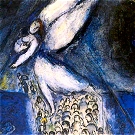
12.19.21 (Tevet 15, 5782) Over the next several weeks (until the middle of March, 2022) we will be reading and studying the Book of Exodus (סֵפֶר שְׁמוֹת) and considering its message in light of revelation of Yeshua our Messiah (there are forty chapters in this book that are traditionally divided into eleven weekly Torah readings). Some of the greatest narratives of all the Scriptures are found in this amazing book, including the Israelites' enslavement and subsequent deliverance with the ten plagues by the hand of the LORD. After the great Passover, Moses led the people out of the land Egypt, crossing the Sea of Reeds, and arriving at Sinai to receive the Torah exactly 49 days later. While Moses was on the mountain, however, the people worshipped a Golden Calf, and a long period of repentance occurred until the covenant was reestablished. The remainder of the book describes the vision and construction of the Mishkan (Tabernacle) -- the great Altar upon which a defect-free lamb was offered every day and every night...
In English the word "Exodus" ("going out") comes from the title of the ancient Greek translation of the phrase Sefer Yetziat Mitzraim ("the book of the going out from Egypt"). Hence the Greek word ἔξοδος became "Exodus" in Latin which later was adopted into English. In the Hebrew Bible this book is called Shemot ("names"), following the custom of naming a book according to its first significant word.
Parashat Shemot - שמות

12.19.21 (Tevet 15, 5782) Our Torah reading for this week is the very first of the Book of Exodus, called parashat Shemot (שְׁמוֹת). This portion begins directly where the Book of Genesis left off, namely by listing the various "names" (shemot) of the descendants of Jacob who came to Egypt to live in the land of Goshen. Over time Jacob's family flourished and multiplied so greatly that the new king of Egypt – who did not "remember" Joseph - regarded them as a political threat and decided to enslave them. When the king's oppression did not curb their growth, however, he cruelly commanded the Hebrew midwives to kill all newborn Jewish boys. When the midwives bravely refused to obey, however, the Pharaoh commanded that all newborn boys were to be drowned in the Nile river (the Hebrew word for Egypt, Mitzrayim (מִצְרַיִם), can be rearranged to form the phrase tzar mayim (צַר מַיִם), meaning "torture through water," which was the plan of the nefarious Pharaoh).
During this time of terrible and appalling oppression, a family from the tribe of Levi bore a son and hid him for three months. When the baby could no longer be concealed, however, his mother Yocheved (יוֹכֶבֶד) set him afloat in the Nile River inside a basket, praying that he might somehow escape death. Miriam (מִרְיָם), the baby's sister, watched what would happen, and soon the basket was discovered by the daughter of Pharaoh, who decided to save the baby and adopt him as her own son. Miriam then cleverly offered to have her mother become the baby's wet-nurse for the princess. After the child was duly weaned, he was brought to Pharaoh's palace to live as the princess' son. The Egyptian princess named him "Moses" (משֶׁה), meaning "drawn out" (מָשָׁה) of the water.
Later, when Moses was a full-grown man, he "went out to his people and looked on their burdens." When he saw an Egyptian beating an Israelite slave, he killed the Egyptian and hid his body in the sand. The following day he tried to reconcile two Israelites who were fighting, but the one in the wrong prophetically objected: "And who made you a prince and judge over us? Do you want to kill me as you killed the Egyptian yesterday?" Upon hearing this Moses decided to flee from Egypt to Midian. There he rescued Zipporah (צִפּרָה), the daughter of Jethro (יִתְרוֹ), a Midianite priest. Soon afterward, Moses decided to work for Jethro and married Zipporah. They had a son named Gershom (גֵּרְשׁם).
After nearly 40 years living in Midian as a shepherd, God called out to Moses from the midst of a burning bush (סְנֶה בּוֹעֵר) to commission him to lead the Israelites out of Egypt back to the land He promised to the descendants of Abraham, Isaac, and Jacob. When Moses protested that he was inadequate for this task, God gave him three "signs" to authenticate his message. God also appointed his brother Aaron to be his spokesperson. Moses and Aaron then went to the Pharaoh and demanded that the Israelites be permitted to leave Egypt to worship the LORD in the wilderness. The Pharaoh, however, dismissed Moses and his God, and increased the workload of the slaves by forcing them to make bricks without straw.
May we all have great joy and strength as we begin reading a new book of Torah this holiday week. Chazak ve'amatz, mechayil el-chayil chaverim...
The Struggle of Faith...

12.17.21 (Tevet 13, 5782) In the Scriptures it is written: "You shall not worship the LORD your God in that way" (Deut. 12:4), which referred to various Canaanite practices of idolatry based on mystery, ignorance and superstition. Unlike religious cults that were based on vain speculations, however, Jews are duty-bound to carry out God's will as expressed by the truth of divine revelation. Our father Abraham was given revelation of Torah (Gen. 26:5) and at Sinai moral truth was enshrined in the Ten Commandments (Exod. 24:12; Deut. 5:22).
A basic assumption of Torah is that "ought implies can," or that we are genuinely responsible to know and to do moral truth (Rom. 1:18-20). Unlike the ancient "mystery religions" that abandoned themselves by "celebrating" the lower nature, God insists on overruling our base impulses and finding peace in the midst of the struggle to live in righteousness (Gal. 5:16-17). Therefore we do not understand the Hebrew word "shalom" (שָׁלוֹם), or "peace," to mean the absence of strife, but rather "wholeness," "completeness," and "healing" -- the integration of the heart and mind that comes through catharsis and personal struggle (Gen. 32:28). Faith does not mean passivity, but protest -- "arguing" for (and sometimes with) heaven, reminding God of his promises, lamenting over the divine absence; finding courage to oppose the status quo, and repeatedly appealing to heaven "be'khol levaveinu" (בְּכָל־לְבָבֵנוּ) -- with all our hearts -- precisely because we believe that our prayers can affect even the divine decrees... True faith confesses to "move mountains into the sea" (Mark 11:23) and refuses to let go of God until it receives the promised blessing to become "Israel" (Gen. 32:26).
Hebrew Lesson:
Isaiah 32:17 Hebrew reading:
Note: As many of you know, "tzedakah" (צדקה) refers to our duty to "do righteousness" (i.e., la'asot tzedakah: לעשות צדקה) which can take the form of good works or deeds (i.e., ma'asei tovim: מעשה טובים), doing acts of kindness (i.e., gemilut chassidim: גמילות חסדים), studying Torah (i.e., talmud Torah: תלמוד תורה), engaging in prayer (i.e., avodat ha'lev: עבודת הלב), and offering charity (i.e., mattan tzedakah: מתן צדקה). Living in accordance with the righteousness of Messiah (צדקת משיח) yields a life of peace, inner quiet, and confidence that comes from the Spirit of God.
What a week.... Shabbat shalom to you all.
Love's Great Humility...

12.17.21 (Tevet 13, 5782) "Unless you turn (shuv) and become like children, you will never (οὐ μὴ) enter the kingdom of heaven" (Matt. 18:3). Such is the importance of simple trust in God... Indeed Yeshua repeatedly taught us to trust God as "Abba," our Father (אַבָּא אָבִינוּ). He taught that we are warmly accepted as part of his family; that we are under his constant care; and that we live within his household as beloved children... And even though God is utterly transcendent, the Infinite One (אין סוף) and Creator of all worlds, he humbles himself to feed the birds of the air, to water lilies of the field, and to count the number of hairs on your head (Psalm 113:5-6). He is as close as your next breath; he leans upon your bosom at the table; he anticipates what you need before you ask him... The "fear of the Lord" is that you might fail knowing his great love for you -- that you will forget or lose sight of your true identity in lesser things. Therefore affirm the truth that you are loved with an unending and everlasting love, that you are safe, that you are surely accepted, and that nothing can ever separate you from the power of love. God your Father hears you, he knows you, and he loves you bekhol levavo (בְּכָל־לְבָבוֹ) - "with all his heart."
May we know God as our beloved Abba. "For you did not receive the spirit of slavery to fall back into fear, but you have received the Spirit of adoption by whom we cry, "Abba! Father!" The Spirit bears witness with our spirit that we are children of God, and if children, then heirs - heirs of God and fellow heirs with Messiah - even if we may suffer together with him to the end that we may also be glorified together with him" (Rom. 8:15-17). Amen...
Hebrew Lesson:
Psalm 69:32 Hebrew reading:
Quick Health Update....

12.16.21 (Tevet 12, 5782) Shalom friends. Now that I'm at home, I can sleep better and recover more quickly than while I was at the hospital. And I am doing better, thanks be to God; my blood oxygen levels are holding; I am working on breathing exercises, and generally I am trying to take it easy. My legs are still weak from the dehydration (I have trouble going up stairs); I have numerous body aches, and asthma control is still a struggle. Of course I am very thankful for all your prayers and kindness shown to me!
Hebrew Lesson:
Psalm 136:1 Hebrew reading:
Cries of the Heart...
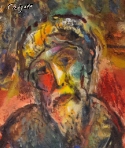
12.16.21 (Tevet 12, 5782) Life is oten a messy business for us. We are weak. We are tempted, and we regularly fail. We are filled with ambivalence; we contradict ourselves; we struggle; we falter, we sin. At times we may even feel lost and inconsolably alone. But faith is a gift from heaven - the gift of God's presence, and as such the miracle attests that "God is with us," even in our times of darkness, in moments of sadness, heartache, confusion, anger, and fear. Where is God in our sorrows, our losses, our nightmares? He is with us. Despite the blindness of our hearts, the Spirit whispers: "I am with you." Yea, God never leaves us; he never forsakes us. He cares. His heart spans "the breadth and length and height and depth" of all that we are, expressed in his eviscerated groans for our deliverance, in drops of blood sweat out in his passion, in the forsakenness and utmost anguish of the cross... Faith believes and then sees.
God is with us, yet in the busyness of the everyday we often lose sight of him. We forget. We go dark. We go into exile. And then in "the mercy of our misery" we sense the call of his heart once again: "Come unto me, you who labor and are heavy laden, and I will give you rest..." We slow down and again seek his "hidden" Presence, remembering his greatness and turning our thoughts back to what is ultimately real... What we thought was so big -- the dramas of this world -- suddenly seems small and insignificant. We remember the LORD our God; we revisit what matters most of all. And as we do so, the Spirit of God begins to flow within us as we reconnect with our true identity as God's beloved child. We come back to the open arms our Savior. He is alive; Jesus is real; we belong to him and he will lead us into the depths of his love forever and ever... Amen.
Friend, if you struggle inwardly with sin and despair over yourself, remember: Faith is itself the struggle to believe, and therefore the struggle reveals the presence of earnestness within you... God sees you and will hear the cry of your heart...
Hebrew Lesson:
Psalm 102:2 Hebrew reading:
Note: Some of what I share here is intended for those who are hurting, struggling, etc., so if you are not dealing with those issues, then ignore the post.... I am trying to reach out to many people in many different places in their lives. Unlike the idea that there is some "one-size fits all" medicine for everybody irrespective of their unique biochemistry, etc., in matters of the spirit every person is an individual with unique heart needs. Thank you for your understanding.
The Hope of Despair...

12.16.21 (Tevet 12, 5782) Our most serious struggles are inward, matters of heart that wrestle with dark emotions like fear, anger, disappointment, and guilt. We often despair over the contradiction between our ideals and our realities; we deny reality and then feel lost and unlovable in the hardness of unspoken shame...
On the deepest level, however, the presence of despair may be a sign of real hope, since it may express a holy "protest" over what the heart knows is wrong in its yearning for deliverance from its own wretchedness. The desperate heart knows it must find God or die. This sort of despair laments because it believes, and it believes in the midst of its lament.
As Yeshua said, "Blessed are those who are poor in spirit - the needy, the bankrupt, the powerless - for theirs is the Kingdom of heaven" (Matt. 5:3). The hidden life of the seed is not released until it first is broken and dies (John 12:24).
Hebrew Lesson:
Matthew 5:3 Hebrew reading:
The fact that God knows the number of hairs on your head means that he knows you better than you know yourself... Your heavenly Father "sees in secret," and that also means that he can and will save you from whatever is hidden within you that still resists his love and touch... We have to trust in God's power to heal us, even when it seems that healing is not forthcoming, even when we still find ourselves divided, troubled, and anxious. We have to believe that God's help is always present. "Be strong, and let your heart take courage, all you who hope for the LORD" (Psalm 31:24).
God sees what He does within us, His "it-is-finished" work, the effect of His great salvation within our hearts, even if at this present hour this may be hidden from our eyes... There is appearance, and there is reality; and only God sees what is ultimately real. We have to trust in His promise to be transformed into the divine nature, even if today we find ourselves sinful, needy, and in disrepair... By God's grace we are what we are. So don't give up. We are saved by hope (ἐλπίδι ἐσώθημεν, Rom. 8:24), a hope for you today.
Breath of His Life...

12.15.21 (Tevet 11, 5782) Praise the LORD for "nishmat chayim" (נשׁמת חיים), the "breath of life.... More than ever am I aware that God's power is manifest in our weakness, and that His grace is always sufficient (2 Cor. 12:9). Before I had walked with a limp, but now I am carried by His Breath, His Spirit. We sojourn "b'eretz ha'chayim" (בארץ החיים) in the land of the living; we are "in but not of" this world; we hold fast to the witness of what great things the Lord has done for us. "Therefore I will boast all the more gladly of my weaknesses, so that the power of Messiah may rest upon me." Amen.
Hebrew Lesson:
Psalm 150:6 Hebrew reading:
And He said to me, "dai lekha chasdi" (דַּי לך חַסְדִּי): "My grace is sufficient for you, for My power is made perfect in weakness." Therefore I will boast all the more gladly of my weaknesses, so that the power of Messiah (גְּבוּרַת הַמָּשִׁיחַ) may rest upon me" (2 Cor. 12:9).
Staying Focused...

12.15.21 (Tevet 11, 5782) The essential thing is to remain focused on what is ultimately real... We do this by praying "without ceasing," which means intentionally centering our thoughts and desires in light of the Divine Presence. King David said that he always "set" the LORD before him and therefore he was unmoved in times of testing (Psalm 16:8).
To know the truth means choosing before the audience of God's reality, before the holy witnesses of heaven and the sacredness that inheres in all things, as it is written: התקדשׁתם והייתם קדשׁים כי קדושׁ אני -- "Sanctify yourselves and you shall be holy; for I am holy" (Lev. 11:44). We walk this truth as we trust and learn God's love for us in Yeshua, the One who promises never to leave nor forsake us... As we live by faith, we begin to discover the great truth that "greater is He that is in you, than he that is in the world."
Hebrew Lesson:
Psalm 16:8 Hebrew reading:
Blameless before God...

12.14.21 (Tevet 10, 5782) Being "blameless" (i.e., tamim: תמים) in God's sight means more than just not being guilty. That idea is a bit "neutral," don't you think? How would you feel if a judge said to you "Not guilty!" at the bar of judgment but then sent you on your way, with no further thought of you? The idea of being blameless means more than being exonerated or declared innocent: it is a matter of being drawn into God's love and blessing for you; it is the state wherein you are not only forgiven by God, but accepted, welcomed, wanted, and (if you will pardon the simplification) even "liked" by Him. It is the state of grace given in Yeshua; the blessing of knowing His heart.
God loves us with "an everlasting love" (i.e., ahavat olam: אַהֲבַת עוֹלָם) and draws us in chesed (חֶסֶד, i.e., His faithful love and kindness). As it is written: "I love you with an everlasting love; therefore in chesed I draw you to me" (Jer. 31:3).
Hebrew Lesson:
Jer. 31:3b Hebrew reading:
John's Health Update:

12.14.21 (Tevet 10, 5782) Shalom friends... I was in the hospital with Covid pneumonia for the last three weeks. I've lost 30 pounds and look a but emaciated at this point, though I am finally back from the hospital and recovering at home. I need to take it easy for awhile so my posts here will likely be a bit shorter until I regain more strength.
Olga has been very good to me. I had "ARDS" and lung failure and then severe malnutrition. It was the knock of death and indeed I nearly died. Trying to keep calm and keep oxygen up! The children are okay and Olga during this time, though sad and concerned about what has been happening. Thank you for your prayers for healing! And thank you, Lord, for walking with me in your love and great mercy....
Note: For quick updates about the ministry, go to the H4C Twitter Page.
Hope not cut off...
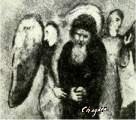
12.14.21 (Tevet 10, 5782) From our Torah portion this week (i.e., Vayechi) we hear the testimony of our father Jacob: "The days of the years of my sojourning are 130 years. Few and evil have been the days of the years of my life.." (Gen. 47:9). Note here that Jacob regards "life" in this vale of tears as a time of "sojourning" (מָגוּר) or pilgrimage as he wanders about until he reaches his true homeland, namely "the place" (הַמָּקוֹם) of the Foundations of God's Presence (see Heb. 11:10). And to you, dear friend, I plead: press on! "Surely there is a future, and your hope will not be cut off" (Prov. 23:18). Stay strong and focused, chaverim: the hour draws near..
Hebrew Lesson:
Prov. 23:18 Hebrew reading:
Hebrew Lesson:
Jer. 31:17a Hebrew reading:
"Until Shiloh Comes..."
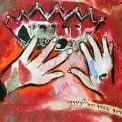
12.13.21 (Tevet 9, 5782) When the time came for Jacob (i.e., Israel) to die, he called all his sons together. According to midrash, Jacob wanted to tell them about the "End of Days" (i.e., acharit ha'yamim: אַחֲרִית הַיָּמִים) when the Messiah would come, but was prevented by the Holy Spirit. According to the Jewish sages, God prevented Jacob because He does not want anyone to know the "day or the hour" when the great King of Israel would appear...
Why not? Why wouldn't God want to tell his children the hour of the promised Messiah's appearance? According to tradition, if people knew how long they would have to wait, they might despair of life altogether, or, if they knew the exact time, they might "repent" just for that reason, and not because it came from the heart...
On the other hand, Jacob's prophecy regarding the coming of the Messiah as a future ruler from the tribe of Judah alluded to the timing of the Messiah's appearance. To review, Jacob prophesied that "the scepter will not depart from Judah, nor the ruler's staff from between his feet, until 'Shiloh' (שִׁילוֹ) comes..." (Gen. 49:10). If the regency of Judah was established in the Jewish Sanhedrin, the scepter (rod of authority) would have departed from Judah in AD 6-7 after the Romans installed a procurator as the authority in Judea. This prophecy, then, would have failed. However, since the Messiah had indeed come and was in their midst as Yeshua mi-netzeret (Jesus of Nazareth) during this time, Jacob's prophecy didn't fail.
Nonetheless, like most prophecies in Scripture, this one has a "dual aspect" or "double fulfillment." The "King of the Jews" (a synonym for the Messiah, called "Christ" by Gentile Christendom) had indeed come "before the scepter departed from Judah," but he went unrecognized since he came to fulfill the role of the Suffering Servant (Mashiach ben Yosef). The second part of the prophecy, "and to him shall be the obedience of the nations," is yet to be fulfilled. It will become a visible reality only after his Second Coming, at the end of olam ha-zeh (this present age), when Jesus comes to judge the nations (the "sheep and the goats") and establish the Kingdom of God from David's throne in Jerusalem.
Note: Jacob's prophecy that "the scepter will not depart from Judah... until Shiloh comes" includes all the letters of the Hebrew alphabet except for the letter Zayin, which is the Hebrew word for weapons, suggesting that when the Messiah comes, it will not be by means of arms or weapons, but rather by the ruach ha-kodesh.
There is an old story of the Magid of Brisk who each year would bring proof from the Torah that the Messiah would come that year. Once a certain Torah student asked him, "Rabbi, every year you bring proof from the Torah that the Messiah must come that year, and yet he does not come. Why bother doing this every year, if you see that Heaven ignores you?" The Magid replied, "The law states that if a son sees his father doing something improper, he is not permitted to humiliate him but must say to him, 'Father, the Torah states thus and so.' Therefore we must tell God, who is our Father, that by keeping us in long exile, he is, in a sense, causing injustice to us, and we must point out, "thus and so it is written in the Torah," in hope that this year he might redeem us." This same principle, of course, applies to those of us who are living in exile and who eagerly await the second coming of the Messiah Yeshua. We should continue asking God to send Him speedily, and in our day, chaverim...
Regarding the Messiah's Second Coming, we therefore find ourselves in the same position of expectation as Israel's sons who heard the original prophecy. Though Yeshua told us about the "signs" of the time (and the "fig tree has brought forth its leaves," see Matt. 24:32-33), we do not know the exact "day or the hour" and therefore must be ready for his return at any time (Matt. 24:36-25:13). The Spirit and the Bride say, "Come." Maran ata, Yeshua!
Hebrew Lesson:
Genesis 49:10 Hebrew reading:
Vayechi - "And He Lived..."
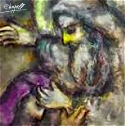
[ Our Torah for this week is Parashat Vayechi, the final portion from the Book of Genesis, which includes Jacob's great prophecy of the coming Messiah... ]
12.12.21 (Tevet 8, 5782) Our Torah reading for this week, parashat Vayechi (i.e., Gen. 47:28-50:26), recounts how the great patriarch Jacob adopted Joseph's two sons (Ephraim and Manasseh) as his own children. When Jacob blessed the boys, however, he intentionally reversed the birth order by putting the younger before the older, signifying that the old struggle he had faced as a child was over, and he now understood things differently. And note Ephraim and Manasseh's reaction: the older did not envy the younger, nor did the younger boast over the older. The family had apparently learned that blessing from God is for the good of all, and that there is no real blessing apart from genuine humility that esteems the welfare of others. Following this, Jacob was ready to summon his family to hear his final words. Among other things, he foretold how the King of Israel, the Messiah, would descend from the tribal line of Judah, and then he careully instructed his sons to bury him only in the promised land, and not in the land of Egypt (Gen. 49:10-12; 49:29-32).
Hebrew Lesson:
Genesis 47:28a Hebrew reading lesson (click):
After his death, Joseph and his brothers, with various dignitaries of Egypt, formed a funeral procession and returned to Canaan to bury Jacob in the Cave of Machpelah in Hebron. After the funeral, they returned to Egypt, but Joseph's brothers feared that he would now repay them for their former betrayal and threw themselves on his mercy. Joseph reassured them that they had no reason to fear him and reminded them that God had overruled their earlier intent by intending him to be a blessing to the whole world (Gen. 50:20).
The portion ends with the account of the death of Joseph, who made the sons of Israel promise to take his bones with them when the LORD would bring them back to the land of Canaan (alluding to the great Exodus to come). Joseph's faith in the Jewish people's return to the Promised Land is summarized by his statement: "God will surely remember you" (Gen. 50:24). He died at age 110, was embalmed and placed in a coffin in Egypt, full of faith that he would be raised from the dead in the land promised to Abraham, Isaac, and Jacob.
Note: This Shabbat we will finish reading the Book of Genesis (סֵפֶר בְּרֵאשִׁית) for the current Jewish year... This incalculably great book begins with an account of the creation of the universe by the LORD and ends with Joseph being put into a coffin in Egypt. Note that the word translated "coffin" is the Hebrew word aron (אֲרוֹן), a word used elsewhere in the Torah to refer exclusively to the Ark of the Covenant (the ark that Noah built and the ark that Moses was placed in are both called "teivah"). Throughout their desert wanderings after the Sinai revelation, the Israelites actually carried two special arks - one holding the bones of Joseph and the other holding the tablets of the Ten Commandments.
Hebrew Lesson:
Genesis 1:1 Hebrew reading lesson (click):
Hospitalization...

12.11.21 (Tevet 7, 5782) I was hospitalized from the start of December until the 12th, and there are no site updates for this period....
|







